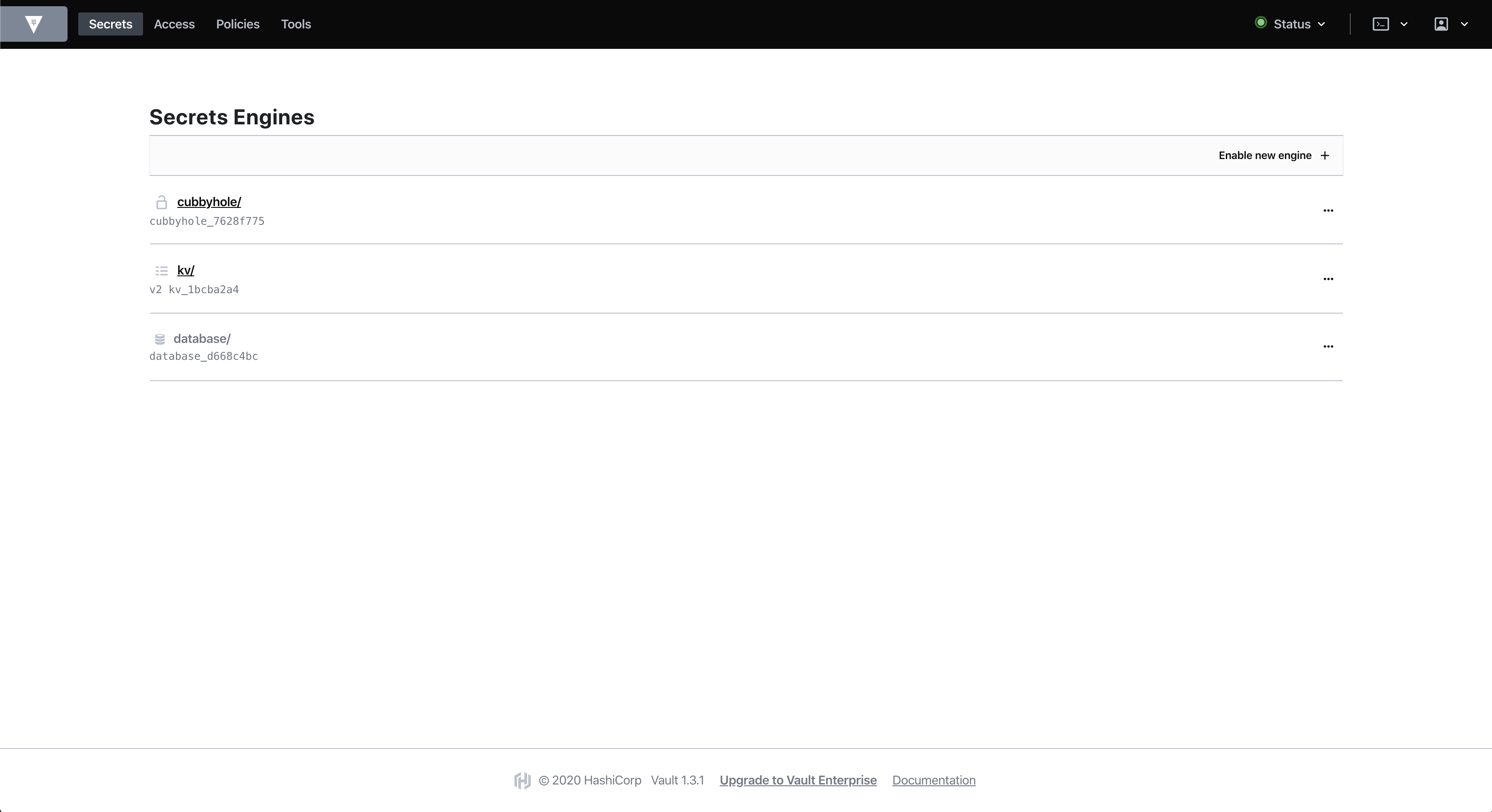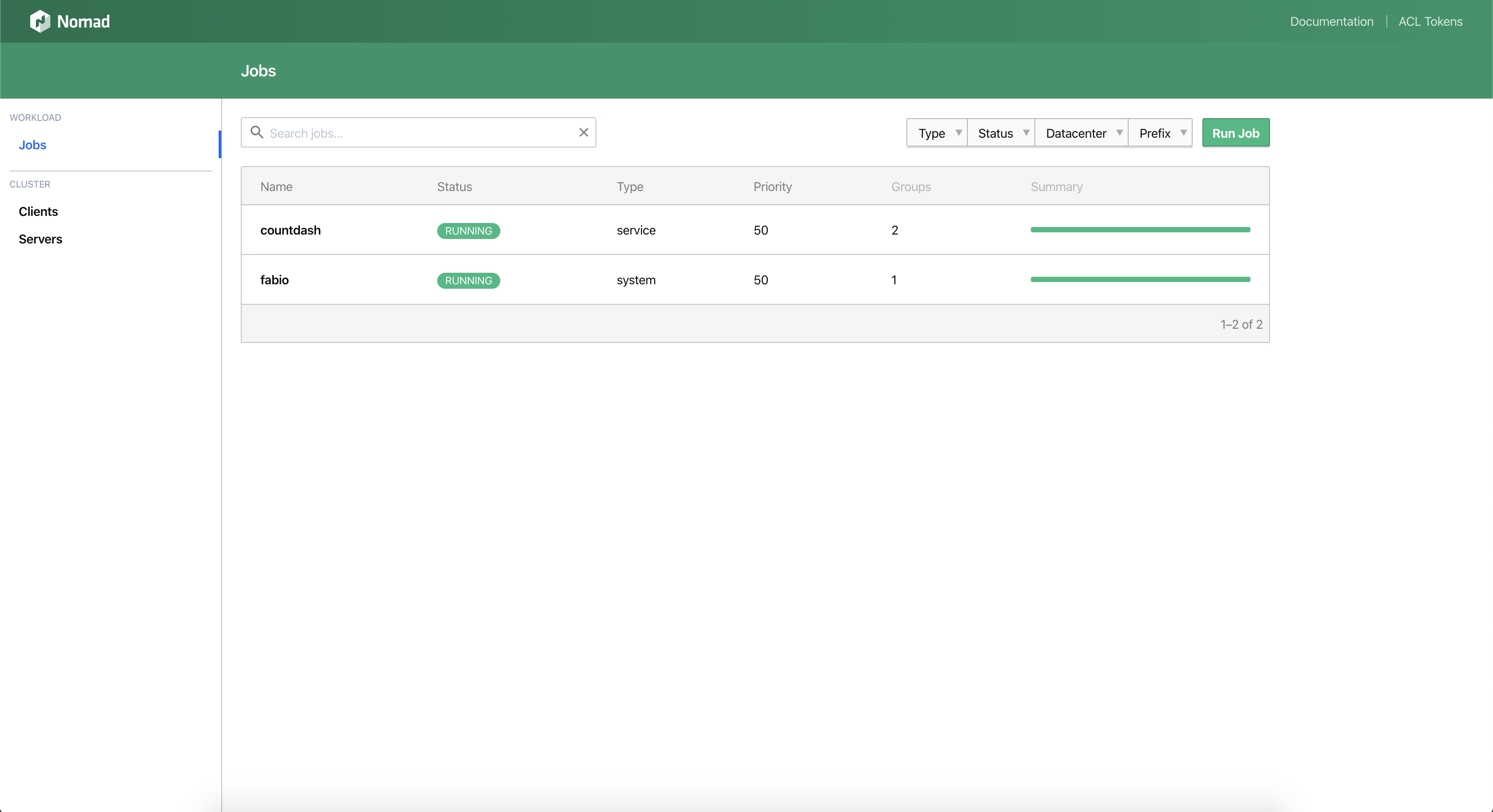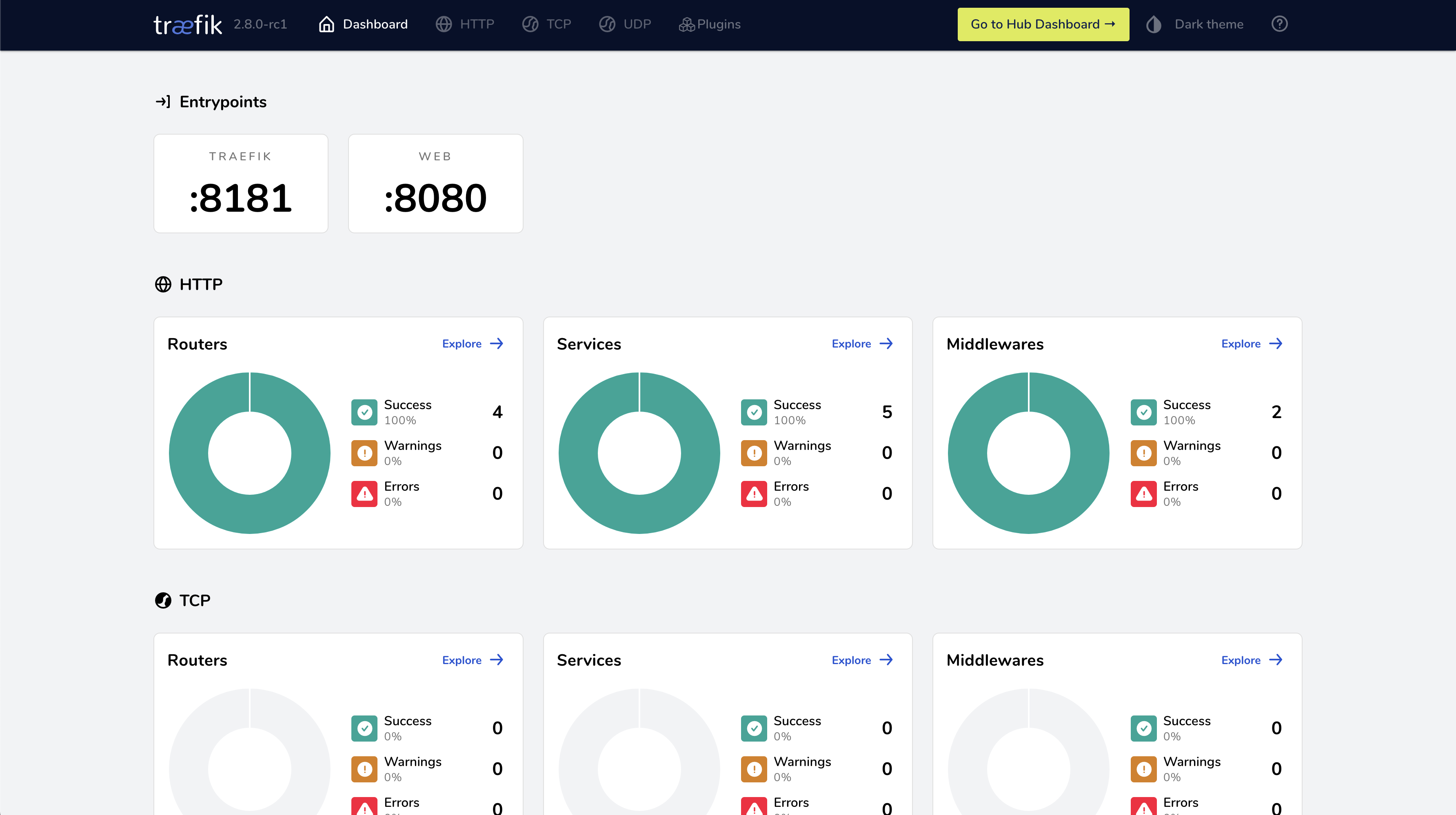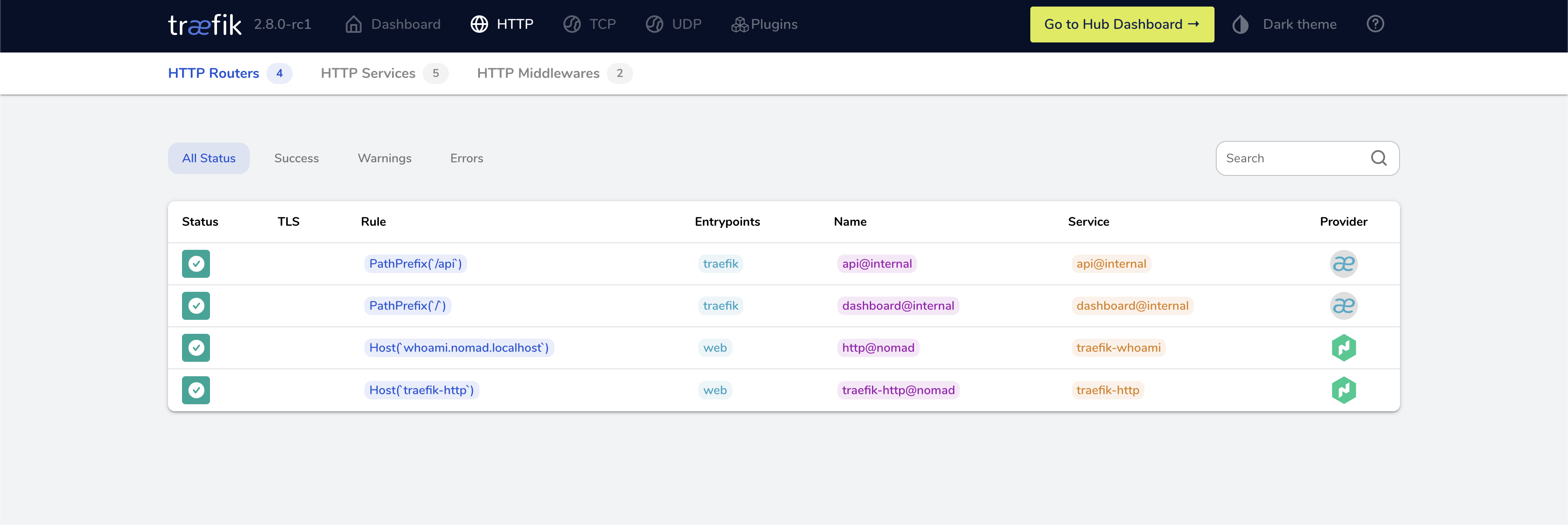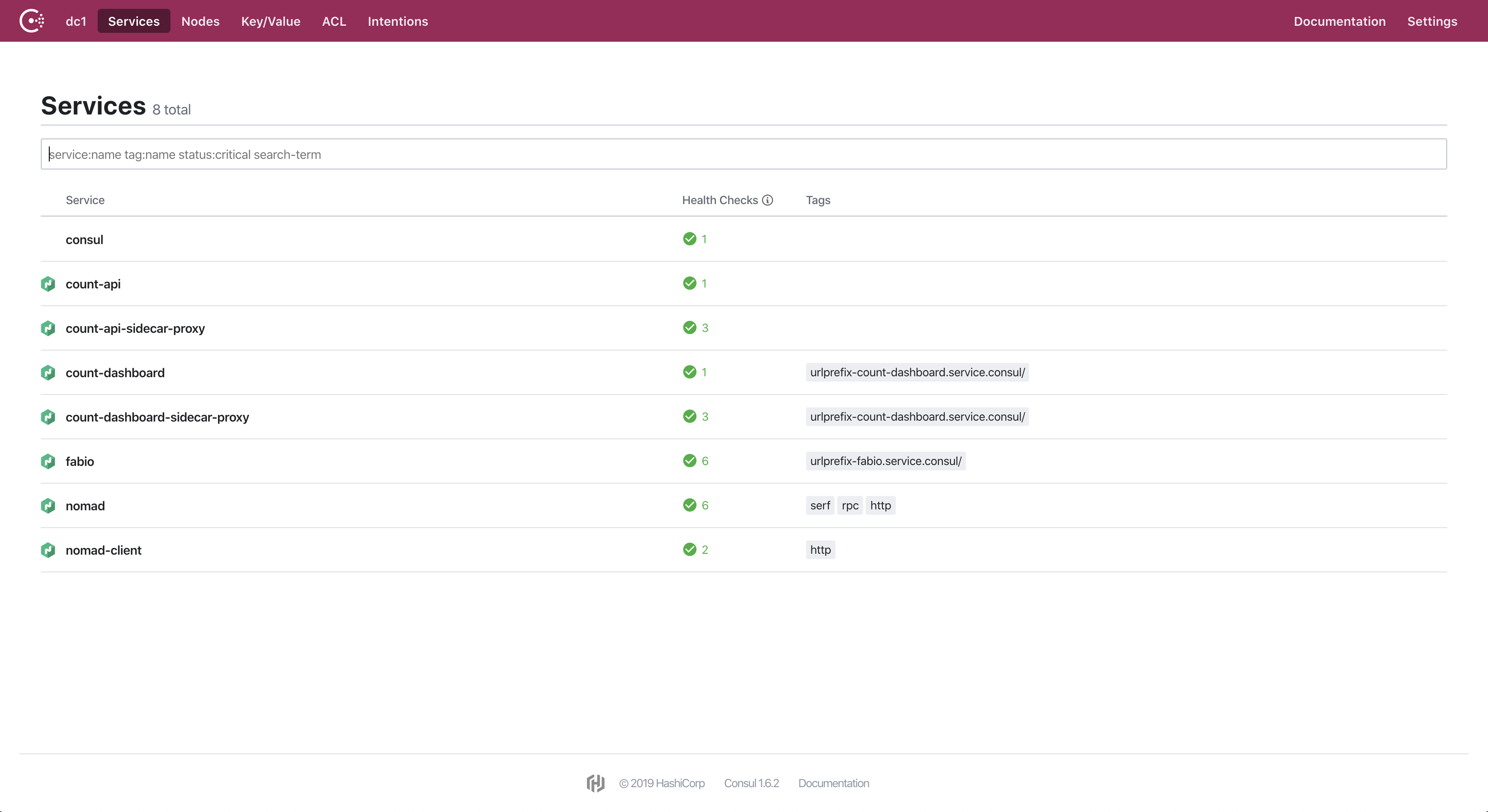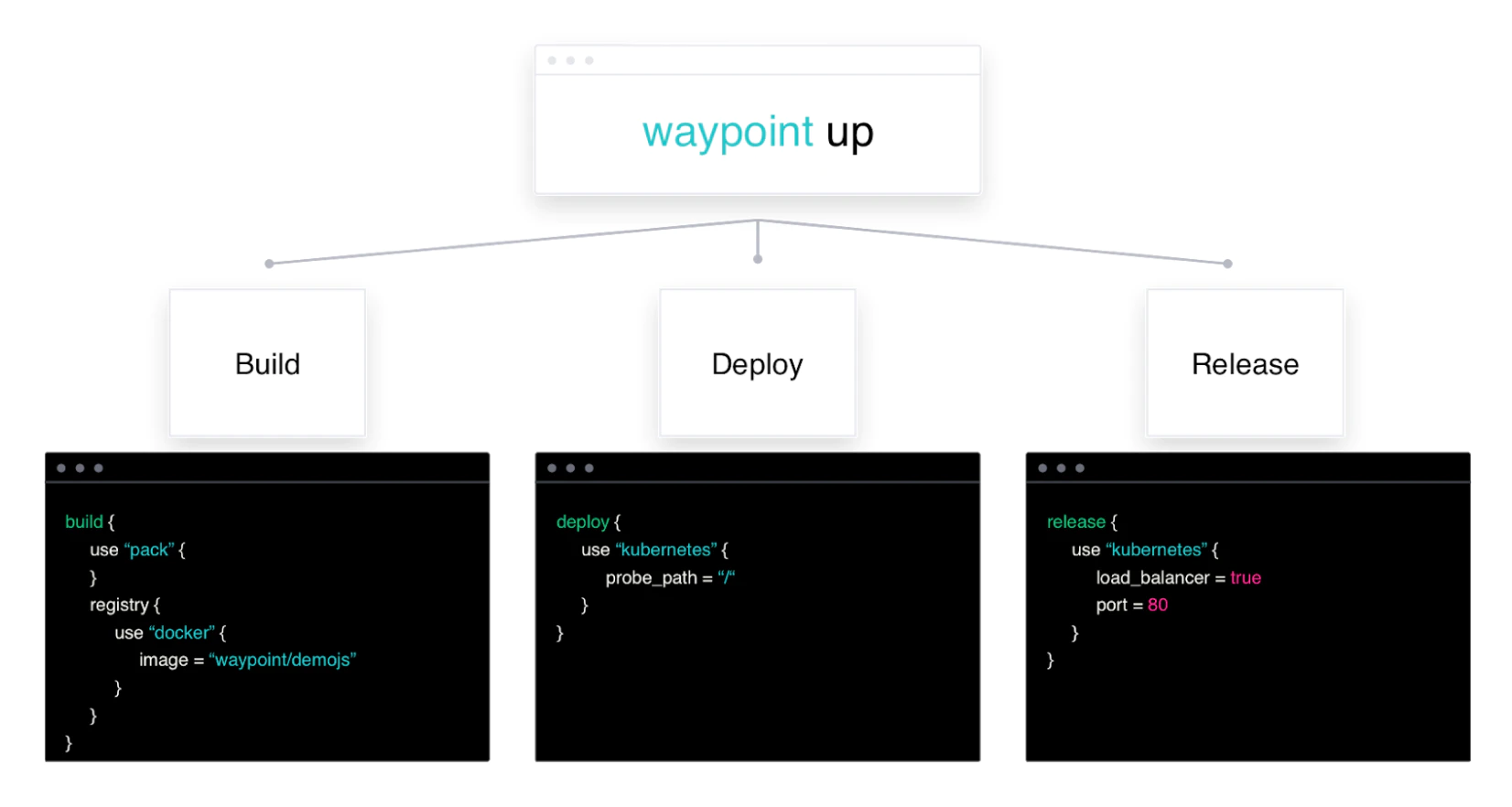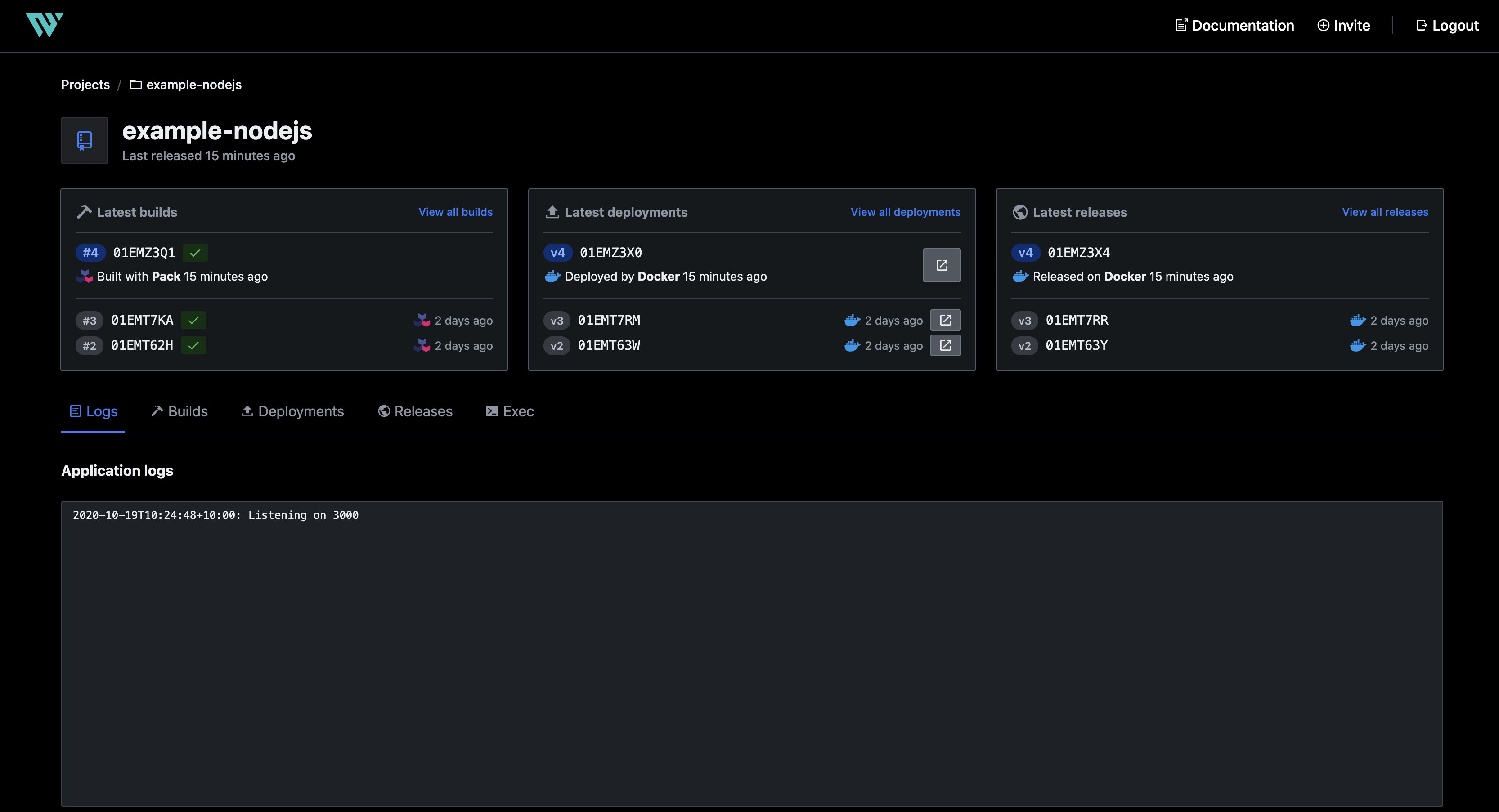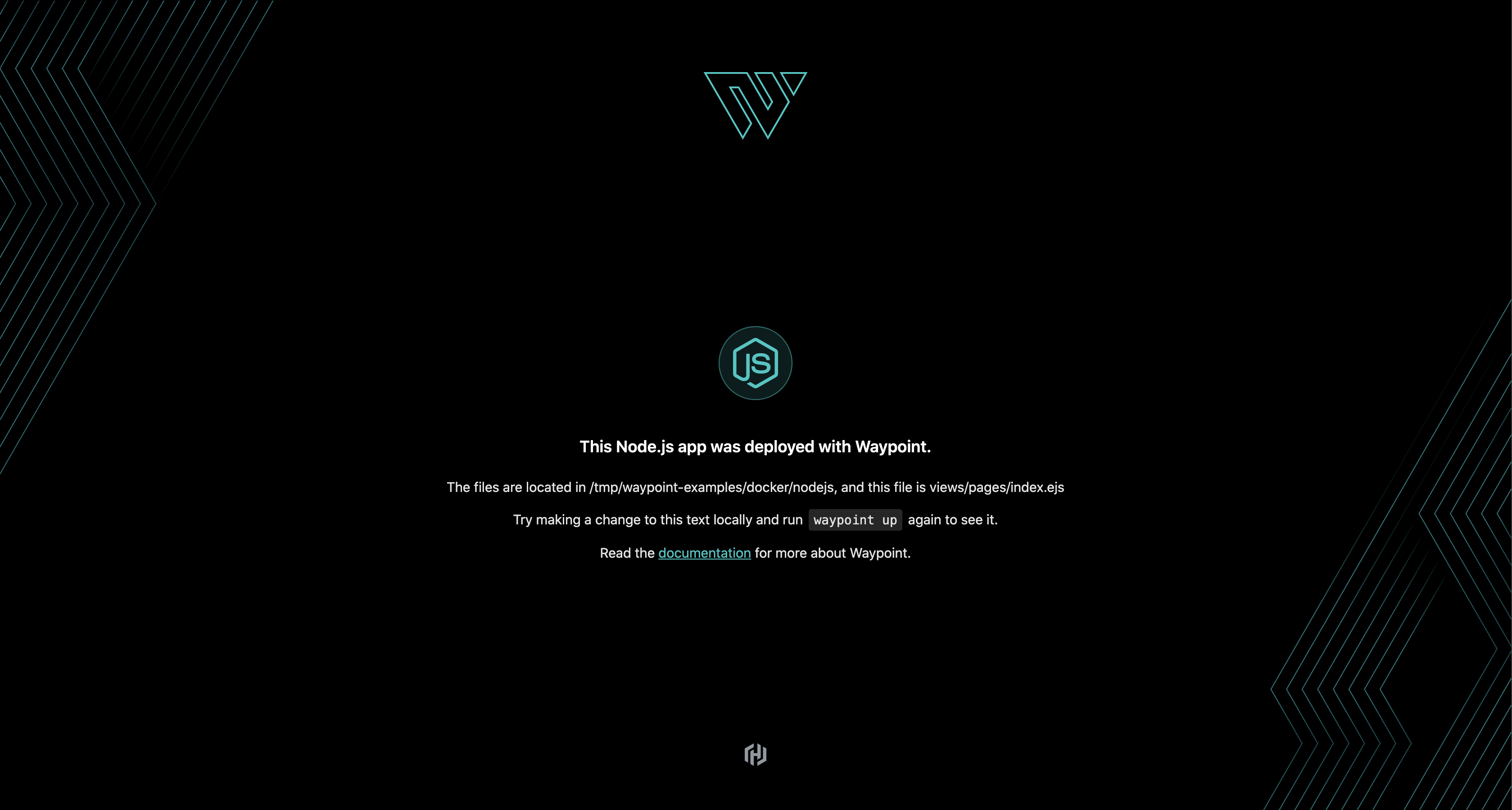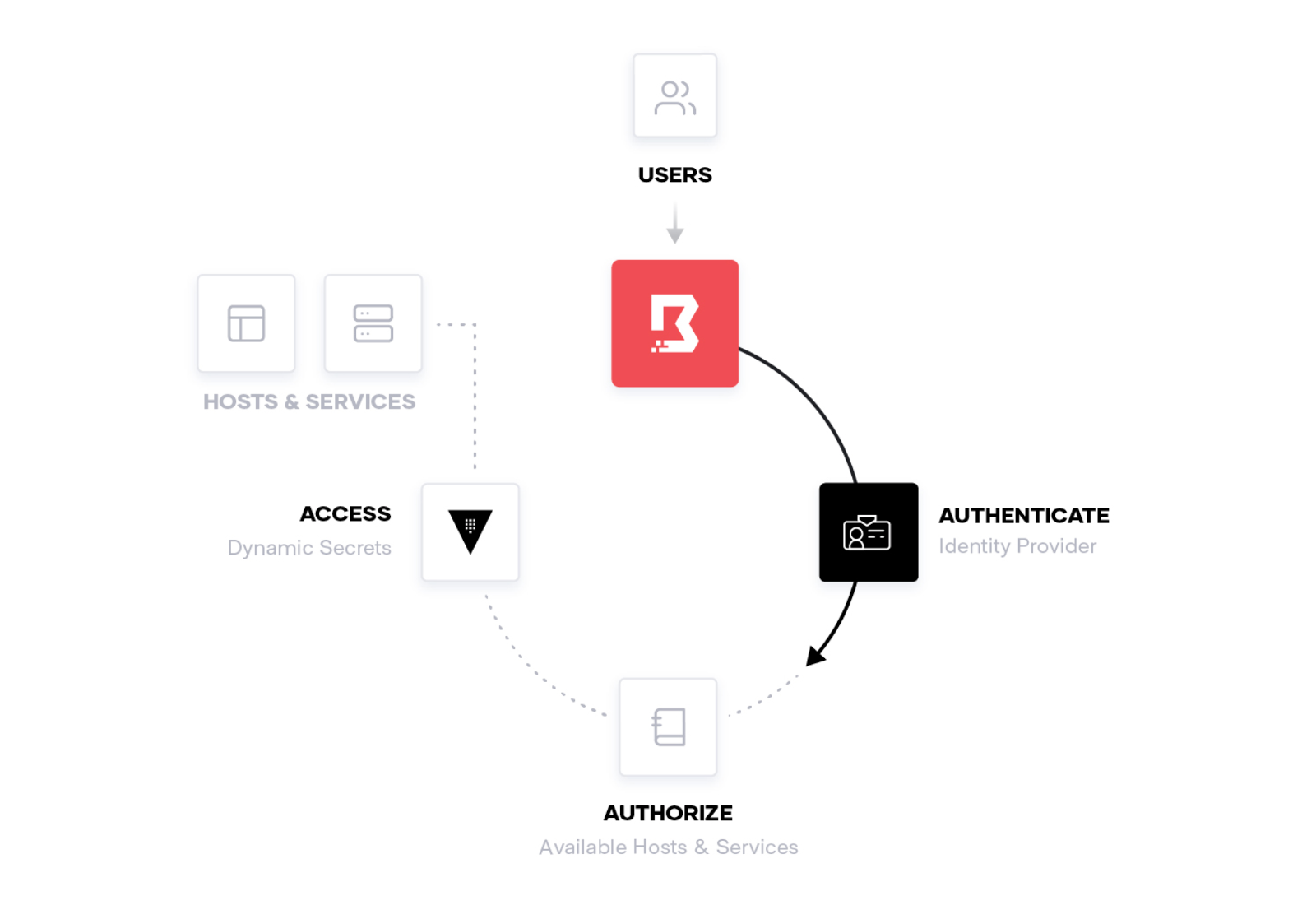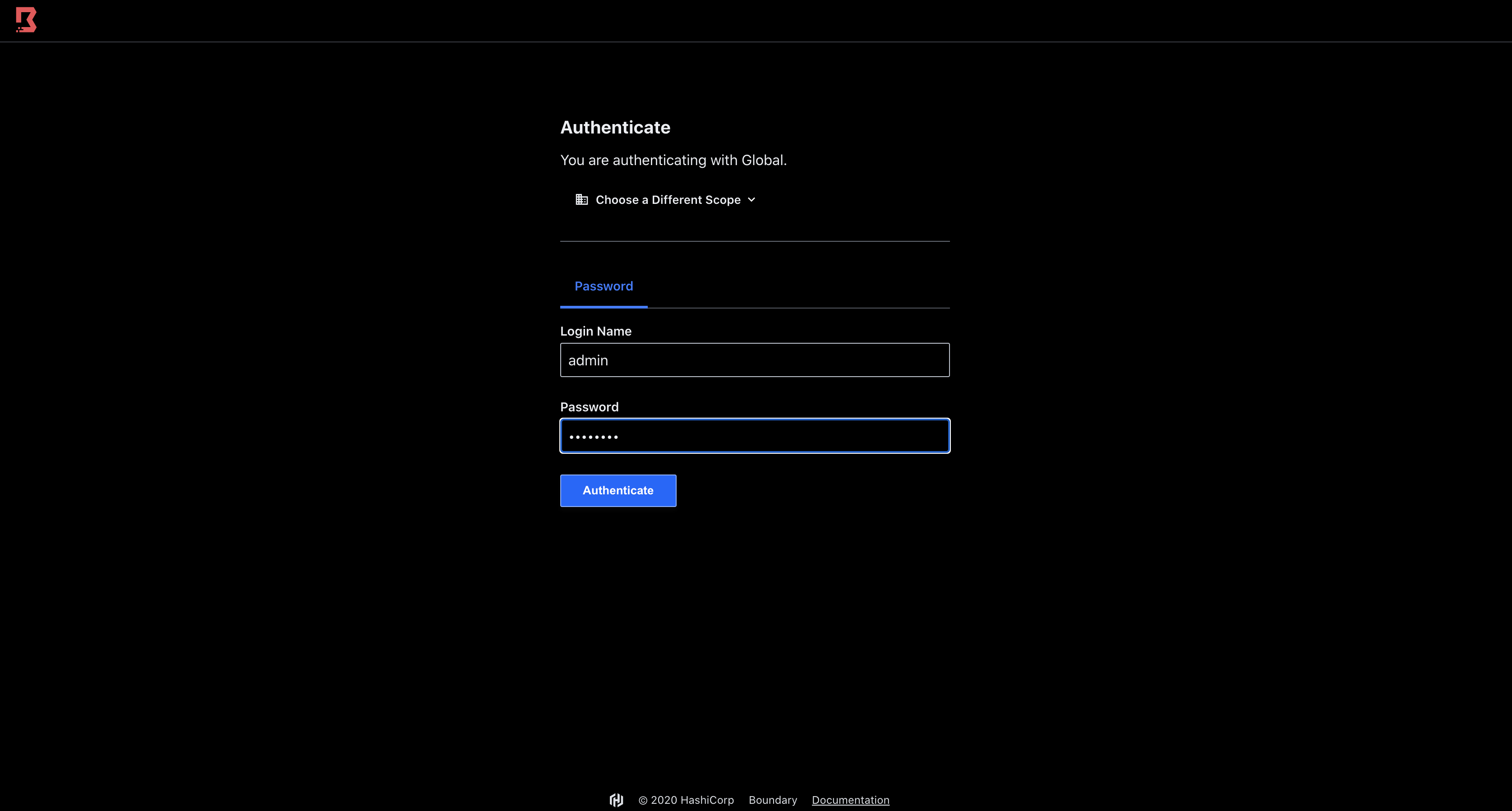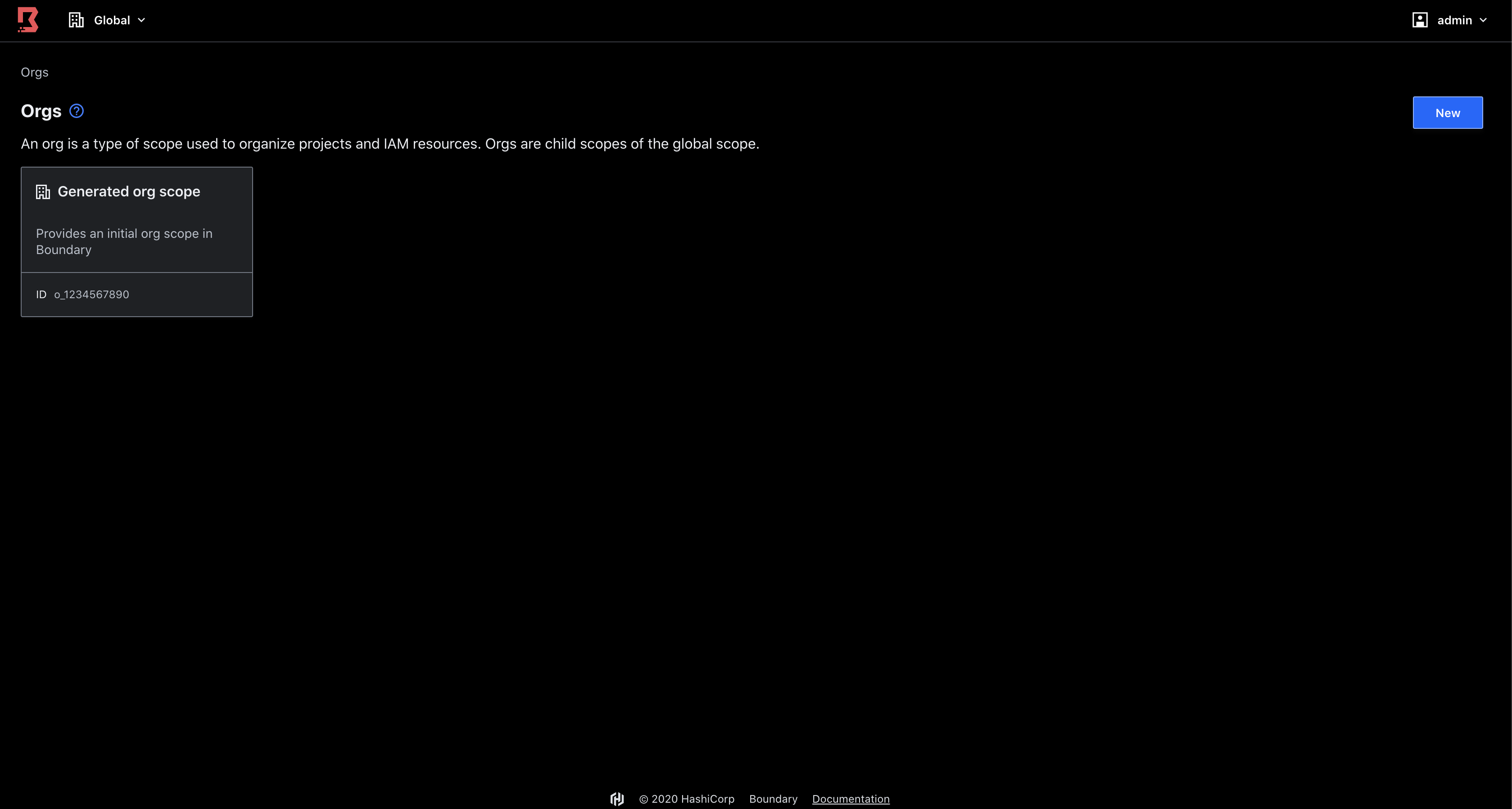http:https://www.hashicorp.com
HashiCorp delivers consistent workflows to provision, secure, connect, and run any infrastructure for any application. HashiCorp was founded by Mitchell Hashimoto and Armon Dadgar in 2012 with the goal of revolutionizing datacenter management: application development, delivery, and maintenance. ... IaaS, PaaS, SaaS. ... Our tools manage both physical machines and virtual machines, Windows, and Linux, SaaS ...
Kelsey Hightower presenting 12-Factor Apps and the HashiStack https://github.com/kelseyhightower/hashiapp
Five years ago the world was introduced to 12 Factor apps which provided the blueprint for building applications for the cloud.
As we move beyond the cloud into Hyperscale computing applications must be designed to be globally available and always on. Building on the foundation of 12 Factor, this session will introduce key requirements for Hyperscale applications such as high performance low latency communication, and playing nice in a distributed system. Attendees will learn how to build Hyperscale applications from the ground up using the HashiStack (Nomad, Vault, and Consul).
HashiCorp Vagrant provides the same, easy workflow regardless of your role as a developer, operator, or designer. It leverages a declarative configuration file which describes all your software requirements, packages, operating system configuration, users, and more.
vagrant up --provision
Bringing machine 'user.local.dev' up with 'virtualbox' provider...
==> user.local.dev: Checking if box 'ubuntu/xenial64' version '20190918.0.0' is up to date...
==> user.local.dev: [vagrant-hostsupdater] Checking for host entries
==> user.local.dev: [vagrant-hostsupdater] found entry for: 10.9.99.10 user.local.dev
==> user.local.dev: [vagrant-hostsupdater] found entry for: 10.9.99.10 user.local.dev
==> user.local.dev: Running provisioner: bootstrap (shell)...
user.local.dev: Running: inline script
user.local.dev: BEGIN BOOTSTRAP 2020-01-10 00:44:49
user.local.dev: running vagrant as user
user.local.dev: Get:1 https://deb.nodesource.com/node_10.x xenial InRelease [4,584 B]
...
user.local.dev: END BOOTSTRAP 2020-01-10 00:45:53
==> user.local.dev: Running provisioner: docker (shell)...
user.local.dev: Running: /var/folders/7j/gsrjvmds05n53ddg28krf4_80001p9/T/vagrant-shell20200110-35289-lj8d6b.sh
...
user.local.dev: ++++ open http:https://localhost:8889 in your browser
user.local.dev: ++++ you can also run below to get apache2 version from the docker container
user.local.dev: ++++ vagrant ssh -c "docker exec -it apache2 /bin/bash -c 'apache2 -t -v'"
==> user.local.dev: Running provisioner: terraform (shell)...
user.local.dev: Running: /var/folders/7j/gsrjvmds05n53ddg28krf4_80001p9/T/vagrant-shell20200110-35289-gf77w9.sh
...
user.local.dev: ++++ Terraform v0.12.18 already installed at /usr/local/bin/terraform
==> user.local.dev: Running provisioner: vault (shell)...
user.local.dev: Running: /var/folders/7j/gsrjvmds05n53ddg28krf4_80001p9/T/vagrant-shell20200110-35289-igtj7e.sh
...
user.local.dev: ++++ Vault already installed and running
user.local.dev: ++++ Vault http:https://localhost:8200/ui and enter the following codes displayed below
...
==> user.local.dev: Running provisioner: consul (shell)...
user.local.dev: Running: /var/folders/7j/gsrjvmds05n53ddg28krf4_80001p9/T/vagrant-shell20200110-35289-u3hjac.sh
user.local.dev: Reading package lists...
...
user.local.dev: ++++ Adding Consul KV data for Fabio Load Balancer Routes
user.local.dev: Success! Data written to: fabio/config/vault
user.local.dev: Success! Data written to: fabio/config/nomad
user.local.dev: Success! Data written to: fabio/config/consul
user.local.dev: ++++ Consul http:https://localhost:8500
==> user.local.dev: Running provisioner: nomad (shell)...
user.local.dev: Running: /var/folders/7j/gsrjvmds05n53ddg28krf4_80001p9/T/vagrant-shell20200110-35289-1s3k8i2.sh
...
user.local.dev: ++++ Nomad already installed at /usr/local/bin/nomad
user.local.dev: ++++ Nomad v0.10.2 (0d2d6e3dc5a171c21f8f31fa117c8a765eb4fc02)
user.local.dev: ++++ cni-plugins already installed
user.local.dev: ==> Loaded configuration from /etc/nomad/server.conf
user.local.dev: ==> Starting Nomad agent...
...
==> user.local.dev: Running provisioner: packer (shell)...
user.local.dev: Running: /var/folders/7j/gsrjvmds05n53ddg28krf4_80001p9/T/vagrant-shell20200110-35289-18twg6l.sh
...
==> user.local.dev: Running provisioner: sentinel (shell)...
user.local.dev: Running: /var/folders/7j/gsrjvmds05n53ddg28krf4_80001p9/T/vagrant-shell20200110-35289-18qv6vf.sh
...
user.local.dev: ++++ Sentinel Simulator v0.9.2 already installed at /usr/local/bin/sentinel
user.local.dev: hour = 4
user.local.dev: main = rule { hour >= 0 and hour < 12 }
user.local.dev: ++++ cat /tmp/policy.sentinel
user.local.dev: hour = 4
user.local.dev: main = rule { hour >= 0 and hour < 12 }
user.local.dev: ++++ sentinel apply /tmp/policy.sentinel
user.local.dev: Pass
==> user.local.dev: Running provisioner: localstack (shell)...
...
==> user.local.dev: Running provisioner: docsify (shell)...
user.local.dev: Running: /var/folders/7j/gsrjvmds05n53ddg28krf4_80001p9/T/vagrant-shell20200110-35289-1du0q9e.sh
...
user.local.dev: ++++ Docsify: http:https://localhost:3333/
Packer is an open source tool for creating identical machine images for multiple platforms from a single source configuration. Packer is lightweight, runs on every major operating system, and is highly performant, creating machine images for multiple platforms in parallel.
Packer will build a Docker container, use the Shell and Ansible provisioners, Ansible will also connect to Vault to retrieve secrets using a Token.
https://learn.hashicorp.com/vault/getting-started/secrets-engines https://docs.ansible.com/ansible/latest/plugins/lookup/hashi_vault.html
We currently create with Packer:
Linux
- Docker: Ubuntu configured with Ansible
Windows
Thanks to StefanScherer:
https://github.com/StefanScherer/packer-windows
https://github.com/StefanScherer/windows-docker-machine
and
joefitzgerald https://github.com/joefitzgerald/packer-windows
and
haxorof https://github.com/haxorof/packer-rhel
- Azure: Windows VM
- Vagrant:
- VMWare:
- Docker:
- HyperV:
https://github.com/StefanScherer/packer-windows
On your Host computer in hashiqube/hashicorp/packer/windows folder, please do:
~/workspace/hashiqube/hashicorp/packer/windows $ packer inspect windows_2019.json
Optional variables and their defaults:
autounattend = ./answer_files/2019/Autounattend.xml
disk_size = 61440
disk_type_id = 1
headless = true
hyperv_switchname = {{env `hyperv_switchname`}}
iso_checksum = 221F9ACBC727297A56674A0F1722B8AC7B6E840B4E1FFBDD538A9ED0DA823562
iso_checksum_type = sha256
iso_url = https://software-download.microsoft.com/download/sg/17763.379.190312-0539.rs5_release_svc_refresh_SERVER_EVAL_x64FRE_en-us.iso
manually_download_iso_from = https://www.microsoft.com/en-us/evalcenter/evaluate-windows-server-2019
restart_timeout = 5m
virtio_win_iso = ~/virtio-win.iso
winrm_timeout = 2h
Builders:
hyperv-iso
qemu
virtualbox-iso
vmware-iso
Provisioners:
windows-shell
powershell
windows-restart
windows-shell
Note: If your build names contain user variables or template
functions such as 'timestamp', these are processed at build time,
and therefore only show in their raw form here.
~/workspace/hashiqube/hashicorp/packer/windows $ packer build --only=virtualbox-iso windows_2019.json
virtualbox-iso: output will be in this color.
==> virtualbox-iso: Retrieving ISO
==> virtualbox-iso: Trying https://software-download.microsoft.com/download/sg/17763.379.190312-0539.rs5_release_svc_refresh_SERVER_EVAL_x64FRE_en-us.iso
==> virtualbox-iso: Trying https://software-download.microsoft.com/download/sg/17763.379.190312-0539.rs5_release_svc_refresh_SERVER_EVAL_x64FRE_en-us.iso?checksum=sha256%3A221F9ACBC727297A56674A0F1722B8AC7B6E840B4E1FFBDD538A9ED0DA823562
==> virtualbox-iso: https://software-download.microsoft.com/download/sg/17763.379.190312-0539.rs5_release_svc_refresh_SERVER_EVAL_x64FRE_en-us.iso?checksum=sha256%3A221F9ACBC727297A56674A0F1722B8AC7B6E840B4E1FFBDD538A9ED0DA823562 => /Users/riaannolan/workspace/hashiqube/hashicorp/packer/windows/packer_cache/c918dc8dbd1474b3d3cfe001787f98e93e18ae0e.iso
==> virtualbox-iso: Creating floppy disk...
virtualbox-iso: Copying files flatly from floppy_files
virtualbox-iso: Copying file: ./answer_files/2019/Autounattend.xml
virtualbox-iso: Copying file: ./scripts/disable-screensaver.ps1
virtualbox-iso: Copying file: ./scripts/disable-winrm.ps1
virtualbox-iso: Copying file: ./scripts/enable-winrm.ps1
virtualbox-iso: Copying file: ./scripts/microsoft-updates.bat
virtualbox-iso: Copying file: ./scripts/win-updates.ps1
virtualbox-iso: Copying file: ./scripts/unattend.xml
virtualbox-iso: Copying file: ./scripts/sysprep.bat
virtualbox-iso: Done copying files from floppy_files
virtualbox-iso: Collecting paths from floppy_dirs
virtualbox-iso: Resulting paths from floppy_dirs : []
virtualbox-iso: Done copying paths from floppy_dirs
==> virtualbox-iso: Creating ephemeral key pair for SSH communicator...
==> virtualbox-iso: Created ephemeral SSH key pair for communicator
==> virtualbox-iso: Creating virtual machine...
==> virtualbox-iso: Creating hard drive...
==> virtualbox-iso: Attaching floppy disk...
==> virtualbox-iso: Creating forwarded port mapping for communicator (SSH, WinRM, etc) (host port 3409)
==> virtualbox-iso: Starting the virtual machine...
virtualbox-iso: The VM will be run headless, without a GUI. If you want to
virtualbox-iso: view the screen of the VM, connect via VRDP without a password to
virtualbox-iso: rdp:https://127.0.0.1:5915
==> virtualbox-iso: Waiting 2m0s for boot...
==> virtualbox-iso: Typing the boot command...
==> virtualbox-iso: Using winrm communicator to connect: 127.0.0.1
==> virtualbox-iso: Waiting for WinRM to become available...
==> virtualbox-iso: #< CLIXML
virtualbox-iso: WinRM connected.
==> virtualbox-iso: <Objs Version="1.1.0.1" xmlns="http:https://schemas.microsoft.com/powershell/2004/04"><Obj S="progress" RefId="0"><TN RefId="0"><T>System.Management.Automation.PSCustomObject</T><T>System.Object</T></TN><MS><I64 N="SourceId">1</I64><PR N="Record"><AV>Preparing modules for first use.</AV><AI>0</AI><Nil /><PI>-1</PI><PC>-1</PC><T>Completed</T><SR>-1</SR><SD> </SD></PR></MS></Obj><Obj S="progress" RefId="1"><TNRef RefId="0" /><MS><I64 N="SourceId">1</I64><PR N="Record"><AV>Preparing modules for first use.</AV><AI>0</AI><Nil /><PI>-1</PI><PC>-1</PC><T>Completed</T><SR>-1</SR><SD> </SD></PR></MS></Obj></Objs>
==> virtualbox-iso: Connected to WinRM!
==> virtualbox-iso: Uploading VirtualBox version info (6.0.14)
==> virtualbox-iso: Provisioning with windows-shell...
==> virtualbox-iso: Provisioning with shell script: ./scripts/vm-guest-tools.bat
virtualbox-iso:
virtualbox-iso: C:\Users\vagrant>if not exist "C:\Windows\Temp\7z1900-x64.msi" (powershell -Command "(New-Object System.Net.WebClient).DownloadFile('https://www.7-zip.org/a/7z1900-x64.msi', 'C:\Windows\Temp\7z1900-x64.msi')" 0<NUL )
virtualbox-iso:
virtualbox-iso: C:\Users\vagrant>if not exist "C:\Windows\Temp\7z1900-x64.msi" (powershell -Command "Start-Sleep 5 ; (New-Object System.Net.WebClient).DownloadFile('https://www.7-zip.org/a/7z1900-x64.msi', 'C:\Windows\Temp\7z1900-x64.msi')" 0<NUL )
virtualbox-iso:
virtualbox-iso: C:\Users\vagrant>msiexec /qb /i C:\Windows\Temp\7z1900-x64.msi
virtualbox-iso:
virtualbox-iso: C:\Users\vagrant>if "virtualbox-iso" EQU "vmware-iso" goto :vmware
virtualbox-iso:
virtualbox-iso: C:\Users\vagrant>if "virtualbox-iso" EQU "virtualbox-iso" goto :virtualbox
virtualbox-iso:
virtualbox-iso: C:\Users\vagrant>if exist "C:\Users\vagrant\VBoxGuestAdditions.iso" (move /Y C:\Users\vagrant\VBoxGuestAdditions.iso C:\Windows\Temp )
virtualbox-iso:
virtualbox-iso: C:\Users\vagrant>if not exist "C:\Windows\Temp\VBoxGuestAdditions.iso" (powershell -Command "[Net.ServicePointManager]::SecurityProtocol = [Net.SecurityProtocolType]::Tls12; (New-Object System.Net.WebClient).DownloadFile('https://download.virtualbox.org/virtualbox/6.0.10/VBoxGuestAdditions_6.0.10.iso', 'C:\Windows\Temp\VBoxGuestAdditions.iso')" 0<NUL )
virtualbox-iso:
virtualbox-iso: C:\Users\vagrant>cmd /c ""C:\Program Files\7-Zip\7z.exe" x C:\Windows\Temp\VBoxGuestAdditions.iso -oC:\Windows\Temp\virtualbox"
virtualbox-iso:
virtualbox-iso: 7-Zip 19.00 (x64) : Copyright (c) 1999-2018 Igor Pavlov : 2019-02-21
virtualbox-iso:
virtualbox-iso: Scanning the drive for archives:
virtualbox-iso: 1 file, 77162496 bytes (74 MiB)
virtualbox-iso:
virtualbox-iso: Extracting archive: C:\Windows\Temp\VBoxGuestAdditions.iso
virtualbox-iso:
virtualbox-iso: WARNINGS:
virtualbox-iso: There are data after the end of archive
virtualbox-iso:
virtualbox-iso: --
virtualbox-iso: Path = C:\Windows\Temp\VBoxGuestAdditions.iso
virtualbox-iso: Type = Iso
virtualbox-iso: WARNINGS:
virtualbox-iso: There are data after the end of archive
virtualbox-iso: Physical Size = 76853248
virtualbox-iso: Tail Size = 309248
virtualbox-iso: Created = 2019-07-12 01:13:14
virtualbox-iso: Modified = 2019-07-12 01:13:14
virtualbox-iso:
virtualbox-iso: Everything is Ok
virtualbox-iso:
virtualbox-iso: Archives with Warnings: 1
virtualbox-iso:
virtualbox-iso: Warnings: 1
virtualbox-iso: Folders: 3
virtualbox-iso: Files: 38
virtualbox-iso: Size: 76740482
virtualbox-iso: Compressed: 77162496
virtualbox-iso:
virtualbox-iso: C:\Users\vagrant>cmd /c for %i in (C:\Windows\Temp\virtualbox\cert\vbox*.cer) do C:\Windows\Temp\virtualbox\cert\VBoxCertUtil add-trusted-publisher %i --root %i
virtualbox-iso:
virtualbox-iso: C:\Users\vagrant>C:\Windows\Temp\virtualbox\cert\VBoxCertUtil add-trusted-publisher C:\Windows\Temp\virtualbox\cert\vbox-sha1.cer --root C:\Windows\Temp\virtualbox\cert\vbox-sha1.cer
virtualbox-iso: VBoxCertUtil.exe: info: Successfully added 'C:\Windows\Temp\virtualbox\cert\vbox-sha1.cer' as trusted publisher
virtualbox-iso: VBoxCertUtil.exe: info: Successfully added 'C:\Windows\Temp\virtualbox\cert\vbox-sha1.cer' as root
virtualbox-iso:
virtualbox-iso: C:\Users\vagrant>C:\Windows\Temp\virtualbox\cert\VBoxCertUtil add-trusted-publisher C:\Windows\Temp\virtualbox\cert\vbox-sha256.cer --root C:\Windows\Temp\virtualbox\cert\vbox-sha256.cer
virtualbox-iso: VBoxCertUtil.exe: info: Successfully added 'C:\Windows\Temp\virtualbox\cert\vbox-sha256.cer' as trusted publisher
virtualbox-iso: VBoxCertUtil.exe: info: Successfully added 'C:\Windows\Temp\virtualbox\cert\vbox-sha256.cer' as root
virtualbox-iso:
virtualbox-iso: C:\Users\vagrant>cmd /c C:\Windows\Temp\virtualbox\VBoxWindowsAdditions.exe /S
virtualbox-iso:
virtualbox-iso: C:\Users\vagrant>rd /S /Q "C:\Windows\Temp\virtualbox"
virtualbox-iso:
virtualbox-iso: C:\Users\vagrant>goto :done
virtualbox-iso:
virtualbox-iso: C:\Users\vagrant>msiexec /qb /x C:\Windows\Temp\7z1900-x64.msi
==> virtualbox-iso: Provisioning with shell script: ./scripts/enable-rdp.bat
virtualbox-iso:
virtualbox-iso: C:\Users\vagrant>netsh advfirewall firewall add rule name="Open Port 3389" dir=in action=allow protocol=TCP localport=3389
virtualbox-iso: Ok.
virtualbox-iso:
virtualbox-iso:
virtualbox-iso: C:\Users\vagrant>reg add "HKEY_LOCAL_MACHINE\SYSTEM\CurrentControlSet\Control\Terminal Server" /v fDenyTSConnections /t REG_DWORD /d 0 /f
virtualbox-iso: The operation completed successfully.
==> virtualbox-iso: Provisioning with Powershell...
==> virtualbox-iso: Provisioning with powershell script: ./scripts/debloat-windows.ps1
virtualbox-iso: Downloading debloat zip
virtualbox-iso: Disable Windows Defender
virtualbox-iso:
==> virtualbox-iso: Uninstall-WindowsFeature : ArgumentNotValid: The role, role service, or feature name is not valid:
==> virtualbox-iso: 'Windows-Defender-Features'. The name was not found.
==> virtualbox-iso: At C:\Windows\Temp\script-5e1aeb39-0fd2-6a09-688e-4196b41ad17f.ps1:20 char:5
virtualbox-iso: Success Restart Needed Exit Code Feature Result
virtualbox-iso: ------- -------------- --------- --------------
virtualbox-iso: False No InvalidArgs {}
virtualbox-iso: Optimize Windows Update
virtualbox-iso: Disable automatic download and installation of Windows updates
virtualbox-iso: Disable seeding of updates to other computers via Group Policies
virtualbox-iso:
virtualbox-iso: Property : {}
virtualbox-iso: PSPath : Microsoft.PowerShell.Core\Registry::HKEY_LOCAL_MACHINE\SOFTWARE\Policies\Microsoft\Windows\DeliveryOpti
virtualbox-iso: mization
virtualbox-iso: PSParentPath : Microsoft.PowerShell.Core\Registry::HKEY_LOCAL_MACHINE\SOFTWARE\Policies\Microsoft\Windows
virtualbox-iso: PSChildName : DeliveryOptimization
virtualbox-iso: PSDrive : HKLM
virtualbox-iso: PSProvider : Microsoft.PowerShell.Core\Registry
virtualbox-iso: PSIsContainer : True
virtualbox-iso: SubKeyCount : 0
virtualbox-iso: View : Default
virtualbox-iso: Handle : Microsoft.Win32.SafeHandles.SafeRegistryHandle
virtualbox-iso: ValueCount : 0
virtualbox-iso: Name : HKEY_LOCAL_MACHINE\SOFTWARE\Policies\Microsoft\Windows\DeliveryOptimization
virtualbox-iso:
virtualbox-iso: Disable 'Updates are available' message
virtualbox-iso:
virtualbox-iso: SUCCESS: The file (or folder): "C:\Windows\System32\MusNotification.exe" now owned by user "VAGRANT-2019\vagrant".
virtualbox-iso: processed file: C:\Windows\System32\MusNotification.exe
virtualbox-iso: Successfully processed 1 files; Failed processing 0 files
virtualbox-iso:
virtualbox-iso: SUCCESS: The file (or folder): "C:\Windows\System32\MusNotificationUx.exe" now owned by user "VAGRANT-2019\vagrant".
virtualbox-iso: processed file: C:\Windows\System32\MusNotificationUx.exe
virtualbox-iso: Successfully processed 1 files; Failed processing 0 files
==> virtualbox-iso: + Uninstall-WindowsFeature Windows-Defender-Features
==> virtualbox-iso: + ~~~~~~~~~~~~~~~~~~~~~~~~~~~~~~~~~~~~~~~~~~~~~~~~~~
==> virtualbox-iso: + CategoryInfo : InvalidArgument: (Windows-Defender-Features:String) [Uninstall-WindowsFeature], Exceptio
==> virtualbox-iso: n
==> virtualbox-iso: + FullyQualifiedErrorId : NameDoesNotExist,Microsoft.Windows.ServerManager.Commands.RemoveWindowsFeatureCommand
==> virtualbox-iso: Restarting Machine
==> virtualbox-iso: Waiting for machine to restart...
==> virtualbox-iso: A system shutdown is in progress.(1115)
virtualbox-iso: VAGRANT-2019 restarted.
==> virtualbox-iso: #< CLIXML
==> virtualbox-iso: <Objs Version="1.1.0.1" xmlns="http:https://schemas.microsoft.com/powershell/2004/04"><Obj S="progress" RefId="0"><TN RefId="0"><T>System.Management.Automation.PSCustomObject</T><T>System.Object</T></TN><MS><I64 N="SourceId">1</I64><PR N="Record"><AV>Preparing modules for first use.</AV><AI>0</AI><Nil /><PI>-1</PI><PC>-1</PC><T>Completed</T><SR>-1</SR><SD> </SD></PR></MS></Obj></Objs>
==> virtualbox-iso: Machine successfully restarted, moving on
==> virtualbox-iso: Provisioning with windows-shell...
==> virtualbox-iso: Provisioning with shell script: ./scripts/pin-powershell.bat
virtualbox-iso:
virtualbox-iso: C:\Users\vagrant>rem https://connect.microsoft.com/PowerShell/feedback/details/1609288/pin-to-taskbar-no-longer-working-in-windows-10
virtualbox-iso:
virtualbox-iso: C:\Users\vagrant>copy "A:\WindowsPowerShell.lnk" "C:\Users\vagrant\AppData\Local\Temp\Windows PowerShell.lnk"
virtualbox-iso: The system cannot find the file specified.
==> virtualbox-iso: 'A:\PinTo10.exe' is not recognized as an internal or external command,
==> virtualbox-iso: operable program or batch file.
virtualbox-iso:
virtualbox-iso: C:\Users\vagrant>A:\PinTo10.exe /PTFOL01:'C:\Users\vagrant\AppData\Local\Temp' /PTFILE01:'Windows PowerShell.lnk'
virtualbox-iso:
virtualbox-iso: C:\Users\vagrant>exit /b 0
==> virtualbox-iso: Provisioning with shell script: ./scripts/set-winrm-automatic.bat
virtualbox-iso:
virtualbox-iso: C:\Users\vagrant>echo Set WinRM start type to auto
virtualbox-iso: Set WinRM start type to auto
virtualbox-iso:
virtualbox-iso: C:\Users\vagrant>sc config winrm start= auto
virtualbox-iso: [SC] ChangeServiceConfig SUCCESS
==> virtualbox-iso: Provisioning with shell script: ./scripts/uac-enable.bat
virtualbox-iso:
virtualbox-iso: C:\Users\vagrant>reg add "HKLM\SOFTWARE\Microsoft\Windows\CurrentVersion\Policies\System" /f /v EnableLUA /t REG_DWORD /d 1
virtualbox-iso: The operation completed successfully.
==> virtualbox-iso: Provisioning with shell script: ./scripts/compile-dotnet-assemblies.bat
virtualbox-iso:
virtualbox-iso: C:\Users\vagrant>if "AMD64" == "AMD64" goto 64BIT
virtualbox-iso:
virtualbox-iso: C:\Users\vagrant>C:\Windows\microsoft.net\framework\v4.0.30319\ngen.exe update /force /queue 1>NUL
virtualbox-iso:
virtualbox-iso: C:\Users\vagrant>C:\Windows\microsoft.net\framework64\v4.0.30319\ngen.exe update /force /queue 1>NUL
virtualbox-iso:
virtualbox-iso: C:\Users\vagrant>C:\Windows\microsoft.net\framework\v4.0.30319\ngen.exe executequeueditems 1>NUL
virtualbox-iso:
virtualbox-iso: C:\Users\vagrant>C:\Windows\microsoft.net\framework64\v4.0.30319\ngen.exe executequeueditems 1>NUL
virtualbox-iso:
virtualbox-iso: C:\Users\vagrant>exit 0
==> virtualbox-iso: Provisioning with shell script: ./scripts/dis-updates.bat
virtualbox-iso:
virtualbox-iso: C:\Users\vagrant>rem http:https://www.windows-commandline.com/disable-automatic-updates-command-line/
virtualbox-iso:
virtualbox-iso: C:\Users\vagrant>reg add "HKEY_LOCAL_MACHINE\SOFTWARE\Microsoft\Windows\CurrentVersion\WindowsUpdate\Auto Update" /v AUOptions /t REG_DWORD /d 1 /f
virtualbox-iso: The operation completed successfully.
virtualbox-iso:
virtualbox-iso: C:\Users\vagrant>rem remove optional WSUS server settings
virtualbox-iso:
virtualbox-iso: C:\Users\vagrant>reg delete "HKEY_LOCAL_MACHINE\SOFTWARE\Policies\Microsoft\Windows\WindowsUpdate" /f
virtualbox-iso: The operation completed successfully.
virtualbox-iso:
virtualbox-iso: C:\Users\vagrant>rem even harder, disable windows update service
virtualbox-iso:
virtualbox-iso: C:\Users\vagrant>rem sc config wuauserv start= disabled
virtualbox-iso:
virtualbox-iso: C:\Users\vagrant>rem net stop wuauserv
virtualbox-iso:
virtualbox-iso: C:\Users\vagrant>set logfile=C:\Windows\Temp\win-updates.log
virtualbox-iso:
virtualbox-iso: C:\Users\vagrant>if exist C:\Windows\Temp\win-updates.log (
virtualbox-iso: echo Show Windows Updates log file C:\Windows\Temp\win-updates.log
virtualbox-iso: dir C:\Windows\Temp\win-updates.log
virtualbox-iso: type C:\Windows\Temp\win-updates.log
virtualbox-iso: rem output of type command is not fully shown in packer/ssh session, so try PowerShell
virtualbox-iso: rem but it will hang if log file is about 22 KByte
virtualbox-iso: rem powershell -command "Get-Content C:\Windows\Temp\win-updates.log"
virtualbox-iso: echo End of Windows Updates log file C:\Windows\Temp\win-updates.log
virtualbox-iso: )
==> virtualbox-iso: Provisioning with shell script: ./scripts/compact.bat
virtualbox-iso:
virtualbox-iso: C:\Users\vagrant>if "virtua" == "hyperv" (
virtualbox-iso: echo "Skip compact steps in Hyper-V build."
virtualbox-iso: goto :eof
virtualbox-iso: )
virtualbox-iso:
virtualbox-iso: C:\Users\vagrant>if not exist "C:\Windows\Temp\7z1900-x64.msi" (powershell -Command "(New-Object System.Net.WebClient).DownloadFile('https://www.7-zip.org/a/7z1900-x64.msi', 'C:\Windows\Temp\7z1900-x64.msi')" 0<NUL )
virtualbox-iso:
virtualbox-iso: C:\Users\vagrant>msiexec /qb /i C:\Windows\Temp\7z1900-x64.msi
virtualbox-iso:
virtualbox-iso: C:\Users\vagrant>if not exist "C:\Windows\Temp\ultradefrag.zip" (powershell -Command "[Net.ServicePointManager]::SecurityProtocol = [Net.SecurityProtocolType]::Tls12; (New-Object System.Net.WebClient).DownloadFile('https://downloads.sourceforge.net/project/ultradefrag/stable-release/6.1.0/ultradefrag-portable-6.1.0.bin.amd64.zip', 'C:\Windows\Temp\ultradefrag.zip')" 0<NUL )
virtualbox-iso:
virtualbox-iso: C:\Users\vagrant>if not exist "C:\Windows\Temp\ultradefrag-portable-6.1.0.amd64\udefrag.exe" (cmd /c ""C:\Program Files\7-Zip\7z.exe" x C:\Windows\Temp\ultradefrag.zip -oC:\Windows\Temp" )
virtualbox-iso:
virtualbox-iso: 7-Zip 19.00 (x64) : Copyright (c) 1999-2018 Igor Pavlov : 2019-02-21
virtualbox-iso:
virtualbox-iso: Scanning the drive for archives:
virtualbox-iso: 1 file, 768893 bytes (751 KiB)
virtualbox-iso:
virtualbox-iso: Extracting archive: C:\Windows\Temp\ultradefrag.zip
virtualbox-iso: --
virtualbox-iso: Path = C:\Windows\Temp\ultradefrag.zip
virtualbox-iso: Type = zip
virtualbox-iso: Physical Size = 768893
virtualbox-iso:
virtualbox-iso: Everything is Ok
virtualbox-iso:
virtualbox-iso: Folders: 5
virtualbox-iso: Files: 166
virtualbox-iso: Size: 2433004
virtualbox-iso: Compressed: 768893
virtualbox-iso:
virtualbox-iso: C:\Users\vagrant>if not exist "C:\Windows\Temp\SDelete.zip" (
virtualbox-iso: powershell -Command "(New-Object System.Net.WebClient).DownloadFile('https://download.sysinternals.com/files/SDelete.zip', 'C:\Windows\Temp\SDelete.zip')" 0<NUL
virtualbox-iso: powershell -Command "(New-Object System.Net.WebClient).DownloadFile('https://vagrantboxes.blob.core.windows.net/box/sdelete/v1.6.1/sdelete.exe', 'C:\Windows\Temp\sdelete.exe')" 0<NUL
virtualbox-iso: )
virtualbox-iso:
virtualbox-iso: C:\Users\vagrant>if not exist "C:\Windows\Temp\sdelete.exe" (cmd /c ""C:\Program Files\7-Zip\7z.exe" x C:\Windows\Temp\SDelete.zip -oC:\Windows\Temp" )
virtualbox-iso:
virtualbox-iso: C:\Users\vagrant>msiexec /qb /x C:\Windows\Temp\7z1900-x64.msi
virtualbox-iso:
virtualbox-iso: C:\Users\vagrant>net stop wuauserv
virtualbox-iso:
==> virtualbox-iso: The Windows Update service is not started.
==> virtualbox-iso:
virtualbox-iso: C:\Users\vagrant>rmdir /S /Q C:\Windows\SoftwareDistribution\Download
virtualbox-iso:
==> virtualbox-iso: More help is available by typing NET HELPMSG 3521.
virtualbox-iso: C:\Users\vagrant>mkdir C:\Windows\SoftwareDistribution\Download
virtualbox-iso:
==> virtualbox-iso:
virtualbox-iso: C:\Users\vagrant>net start wuauserv
virtualbox-iso: The Windows Update service is starting.
virtualbox-iso: The Windows Update service was started successfully.
virtualbox-iso:
virtualbox-iso:
virtualbox-iso: C:\Users\vagrant>if "virtualbox-iso" NEQ "hyperv-iso" (
virtualbox-iso: cmd /c C:\Windows\Temp\ultradefrag-portable-6.1.0.amd64\udefrag.exe --optimize --repeat C:
virtualbox-iso: cmd /c C:\Windows\System32\reg.exe ADD HKCU\Software\Sysinternals\SDelete /v EulaAccepted /t REG_DWORD /d 1 /f
virtualbox-iso: cmd /c C:\Windows\Temp\sdelete.exe -q -z C:
virtualbox-iso: )
virtualbox-iso: UltraDefrag 6.1.0, Copyright (c) UltraDefrag Development Team, 2007-2013.
virtualbox-iso: UltraDefrag comes with ABSOLUTELY NO WARRANTY. This is free software,
virtualbox-iso: and you are welcome to redistribute it under certain conditions.
virtualbox-iso:
virtualbox-iso: C: defrag: 100.00% complete, 7 passes needed, fragmented/total = 6/205593
virtualbox-iso: The operation completed successfully.
virtualbox-iso:
virtualbox-iso: SDelete - Secure Delete v1.61
virtualbox-iso: Copyright (C) 1999-2012 Mark Russinovich
virtualbox-iso: Sysinternals - www.sysinternals.com
virtualbox-iso:
virtualbox-iso: SDelete is set for 1 pass.
virtualbox-iso: Free space cleaned on C:\
virtualbox-iso: 1 drives zapped
virtualbox-iso:
==> virtualbox-iso: Gracefully halting virtual machine...
virtualbox-iso:
==> virtualbox-iso: The service name is invalid.
==> virtualbox-iso:
virtualbox-iso: C:\Users\vagrant>net stop tiledatamodelsvc
==> virtualbox-iso: More help is available by typing NET HELPMSG 2185.
==> virtualbox-iso:
virtualbox-iso:
virtualbox-iso: C:\Users\vagrant>if exist a:\unattend.xml (c:\windows\system32\sysprep\sysprep.exe /generalize /oobe /shutdown /unattend:a:\unattend.xml ) else (
virtualbox-iso: del /F \Windows\System32\Sysprep\unattend.xml
virtualbox-iso: c:\windows\system32\sysprep\sysprep.exe /generalize /oobe /shutdown /quiet
virtualbox-iso: )
virtualbox-iso: Removing floppy drive...
==> virtualbox-iso: Preparing to export machine...
virtualbox-iso: Deleting forwarded port mapping for the communicator (SSH, WinRM, etc) (host port 3409)
==> virtualbox-iso: Exporting virtual machine...
virtualbox-iso: Executing: export WindowsServer2019 --output output-virtualbox-iso/WindowsServer2019.ovf
==> virtualbox-iso: Deregistering and deleting VM...
==> virtualbox-iso: Running post-processor: vagrant
==> virtualbox-iso (vagrant): Creating Vagrant box for 'virtualbox' provider
virtualbox-iso (vagrant): Copying from artifact: output-virtualbox-iso/WindowsServer2019-disk001.vmdk
virtualbox-iso (vagrant): Copying from artifact: output-virtualbox-iso/WindowsServer2019.ovf
virtualbox-iso (vagrant): Renaming the OVF to box.ovf...
virtualbox-iso (vagrant): Using custom Vagrantfile: vagrantfile-windows_2016.template
virtualbox-iso (vagrant): Compressing: Vagrantfile
virtualbox-iso (vagrant): Compressing: WindowsServer2019-disk001.vmdk
virtualbox-iso (vagrant): Compressing: box.ovf
virtualbox-iso (vagrant): Compressing: metadata.json
Build 'virtualbox-iso' finished.
==> Builds finished. The artifacts of successful builds are:
--> virtualbox-iso: 'virtualbox' provider box: windows_2019_virtualbox.box
~/workspace/hashiqube/hashicorp/packer/windows $ ls -lah | grep box
-rw-r--r-- 1 riaannolan staff 4.5G 12 Jan 21:18 windows_2019_virtualbox.box
On your Host computer in hashiqube/hashicorp/packer/linux/rhel folder, please do:
~/workspace/hashiqube/hashicorp/packer/linux/rhel $ packer build --only=virtualbox-iso rhel8.json
virtualbox-iso: output will be in this color.
==> virtualbox-iso: Retrieving Guest additions
==> virtualbox-iso: Trying /Applications/VirtualBox.app/Contents/MacOS/VBoxGuestAdditions.iso
==> virtualbox-iso: Trying /Applications/VirtualBox.app/Contents/MacOS/VBoxGuestAdditions.iso
==> virtualbox-iso: /Applications/VirtualBox.app/Contents/MacOS/VBoxGuestAdditions.iso => /Users/riaannolan/workspace/hashiqube/hashicorp/packer/linux/rhel/packer_cache/7784a55a71d48a1e9b5c487431438fef0f19d87f.iso
==> virtualbox-iso: Retrieving ISO
==> virtualbox-iso: Trying iso/rhel-8.1-x86_64-dvd.iso
==> virtualbox-iso: Trying iso/rhel-8.1-x86_64-dvd.iso?checksum=sha256%3A2323ad44d75df1a1e83048a34e196ddfedcd6c0f6c49ea59bf08095e3bb9ef65
==> virtualbox-iso: iso/rhel-8.1-x86_64-dvd.iso?checksum=sha256%3A2323ad44d75df1a1e83048a34e196ddfedcd6c0f6c49ea59bf08095e3bb9ef65 => /Users/riaannolan/workspace/hashiqube/hashicorp/packer/linux/rhel/packer_cache/e0829642bf518828676fda5c2502fd75ea3a305b.iso
==> virtualbox-iso: Starting HTTP server on port 8182
==> virtualbox-iso: Creating virtual machine...
==> virtualbox-iso: Creating hard drive...
==> virtualbox-iso: Creating forwarded port mapping for communicator (SSH, WinRM, etc) (host port 2429)
==> virtualbox-iso: Executing custom VBoxManage commands...
virtualbox-iso: Executing: modifyvm packer-rhel-8-x86_64 --memory 1024
virtualbox-iso: Executing: modifyvm packer-rhel-8-x86_64 --cpus 2
==> virtualbox-iso: Starting the virtual machine...
virtualbox-iso: The VM will be run headless, without a GUI. If you want to
virtualbox-iso: view the screen of the VM, connect via VRDP without a password to
virtualbox-iso: rdp:https://127.0.0.1:5919
==> virtualbox-iso: Waiting 10s for boot...
==> virtualbox-iso: Typing the boot command...
==> virtualbox-iso: Using ssh communicator to connect: 127.0.0.1
==> virtualbox-iso: Waiting for SSH to become available...
==> virtualbox-iso: Connected to SSH!
==> virtualbox-iso: Uploading VirtualBox version info (6.0.14)
==> virtualbox-iso: Uploading VirtualBox guest additions ISO...
==> virtualbox-iso: Provisioning with shell script: scripts/cleanup.sh
==> virtualbox-iso: dd: error writing '/EMPTY': No space left on device
==> virtualbox-iso: 5882+0 records in
==> virtualbox-iso: 5881+0 records out
==> virtualbox-iso: 6166740992 bytes (6.2 GB, 5.7 GiB) copied, 11.4726 s, 538 MB/s
==> virtualbox-iso: Gracefully halting virtual machine...
==> virtualbox-iso: Preparing to export machine...
virtualbox-iso: Deleting forwarded port mapping for the communicator (SSH, WinRM, etc) (host port 2429)
==> virtualbox-iso: Exporting virtual machine...
virtualbox-iso: Executing: export packer-rhel-8-x86_64 --output output-virtualbox-iso/packer-rhel-8-x86_64.ovf
==> virtualbox-iso: Deregistering and deleting VM...
==> virtualbox-iso: Running post-processor: vagrant
==> virtualbox-iso (vagrant): Creating Vagrant box for 'virtualbox' provider
virtualbox-iso (vagrant): Copying from artifact: output-virtualbox-iso/packer-rhel-8-x86_64-disk001.vmdk
virtualbox-iso (vagrant): Copying from artifact: output-virtualbox-iso/packer-rhel-8-x86_64.ovf
virtualbox-iso (vagrant): Renaming the OVF to box.ovf...
virtualbox-iso (vagrant): Compressing: Vagrantfile
virtualbox-iso (vagrant): Compressing: box.ovf
virtualbox-iso (vagrant): Compressing: metadata.json
virtualbox-iso (vagrant): Compressing: packer-rhel-8-x86_64-disk001.vmdk
Build 'virtualbox-iso' finished.
==> Builds finished. The artifacts of successful builds are:
--> virtualbox-iso: 'virtualbox' provider box: builds/virtualbox-rhel-8.box
On your Host computer OR in the VM please do:
~/workspace/hashiqube/hashicorp/packer/linux/ubuntu $ vagrant ssh -c "cd /vagrant/hashicorp/packer/linux/ubuntu; packer build ubuntu16.04.json"
docker: output will be in this color.
==> docker: Creating a temporary directory for sharing data...
==> docker: Pulling Docker image: ubuntu:16.04
docker: 16.04: Pulling from library/ubuntu
docker: 3386e6af03b0: Pulling fs layer
docker: 49ac0bbe6c8e: Pulling fs layer
docker: d1983a67e104: Pulling fs layer
docker: 1a0f3a523f04: Pulling fs layer
docker: 1a0f3a523f04: Waiting
docker: 49ac0bbe6c8e: Verifying Checksum
docker: 49ac0bbe6c8e: Download complete
docker: d1983a67e104: Verifying Checksum
docker: d1983a67e104: Download complete
docker: 1a0f3a523f04: Verifying Checksum
docker: 1a0f3a523f04: Download complete
docker: 3386e6af03b0: Verifying Checksum
docker: 3386e6af03b0: Download complete
docker: 3386e6af03b0: Pull complete
docker: 49ac0bbe6c8e: Pull complete
docker: d1983a67e104: Pull complete
docker: 1a0f3a523f04: Pull complete
docker: Digest: sha256:181800dada370557133a502977d0e3f7abda0c25b9bbb035f199f5eb6082a114
docker: Status: Downloaded newer image for ubuntu:16.04
docker: docker.io/library/ubuntu:16.04
==> docker: Starting docker container...
docker: Run command: docker run -v /home/vagrant/.packer.d/tmp020519102:/packer-files -d -i -t --name default ubuntu:16.04 /bin/bash
docker: Container ID: e377a38c8c09fc55c3ac85a61357c2125323d85a4582ab20814a44771145c0bc
==> docker: Using docker communicator to connect: 172.17.0.7
==> docker: Provisioning with shell script: /tmp/packer-shell695982158
docker: Get:1 http:https://security.ubuntu.com/ubuntu xenial-security InRelease [109 kB]
docker: Get:2 http:https://archive.ubuntu.com/ubuntu xenial InRelease [247 kB]
docker: Get:3 http:https://archive.ubuntu.com/ubuntu xenial-updates InRelease [109 kB]
docker: Get:4 http:https://security.ubuntu.com/ubuntu xenial-security/main amd64 Packages [1031 kB]
docker: Get:5 http:https://archive.ubuntu.com/ubuntu xenial-backports InRelease [107 kB]
docker: Get:6 http:https://security.ubuntu.com/ubuntu xenial-security/restricted amd64 Packages [12.7 kB]
docker: Get:7 http:https://security.ubuntu.com/ubuntu xenial-security/universe amd64 Packages [595 kB]
docker: Get:8 http:https://security.ubuntu.com/ubuntu xenial-security/multiverse amd64 Packages [6280 B]
docker: Get:9 http:https://archive.ubuntu.com/ubuntu xenial/main amd64 Packages [1558 kB]
docker: Get:10 http:https://archive.ubuntu.com/ubuntu xenial/restricted amd64 Packages [14.1 kB]
docker: Get:11 http:https://archive.ubuntu.com/ubuntu xenial/universe amd64 Packages [9827 kB]
docker: Get:12 http:https://archive.ubuntu.com/ubuntu xenial/multiverse amd64 Packages [176 kB]
docker: Get:13 http:https://archive.ubuntu.com/ubuntu xenial-updates/main amd64 Packages [1408 kB]
docker: Get:14 http:https://archive.ubuntu.com/ubuntu xenial-updates/restricted amd64 Packages [13.1 kB]
docker: Get:15 http:https://archive.ubuntu.com/ubuntu xenial-updates/universe amd64 Packages [998 kB]
docker: Get:16 http:https://archive.ubuntu.com/ubuntu xenial-updates/multiverse amd64 Packages [19.3 kB]
docker: Get:17 http:https://archive.ubuntu.com/ubuntu xenial-backports/main amd64 Packages [7942 B]
docker: Get:18 http:https://archive.ubuntu.com/ubuntu xenial-backports/universe amd64 Packages [8807 B]
docker: Fetched 16.2 MB in 19s (842 kB/s)
docker: Reading package lists...
docker: Reading package lists...
docker: Building dependency tree...
docker: Reading state information...
docker: The following additional packages will be installed:
docker: file libapt-inst2.0 libexpat1 libffi6 libmagic1 libpython-stdlib
docker: libpython2.7-minimal libpython2.7-stdlib libsqlite3-0 libssl1.0.0
docker: mime-support python-minimal python2.7 python2.7-minimal
docker: Suggested packages:
docker: python-doc python-tk python2.7-doc binutils binfmt-support
docker: The following NEW packages will be installed:
docker: apt-utils file libapt-inst2.0 libexpat1 libffi6 libmagic1 libpython-stdlib
docker: libpython2.7-minimal libpython2.7-stdlib libsqlite3-0 libssl1.0.0
docker: mime-support python python-minimal python2.7 python2.7-minimal
docker: 0 upgraded, 16 newly installed, 0 to remove and 0 not upgraded.
docker: Need to get 5971 kB of archives.
docker: After this operation, 27.0 MB of additional disk space will be used.
docker: Get:1 http:https://archive.ubuntu.com/ubuntu xenial-updates/main amd64 libpython2.7-minimal amd64 2.7.12-1ubuntu0~16.04.9 [338 kB]
docker: Get:2 http:https://archive.ubuntu.com/ubuntu xenial-updates/main amd64 python2.7-minimal amd64 2.7.12-1ubuntu0~16.04.9 [1262 kB]
docker: Get:3 http:https://archive.ubuntu.com/ubuntu xenial-updates/main amd64 python-minimal amd64 2.7.12-1~16.04 [28.1 kB]
docker: Get:4 http:https://archive.ubuntu.com/ubuntu xenial/main amd64 mime-support all 3.59ubuntu1 [31.0 kB]
docker: Get:5 http:https://archive.ubuntu.com/ubuntu xenial-updates/main amd64 libexpat1 amd64 2.1.0-7ubuntu0.16.04.5 [71.5 kB]
docker: Get:6 http:https://archive.ubuntu.com/ubuntu xenial/main amd64 libffi6 amd64 3.2.1-4 [17.8 kB]
docker: Get:7 http:https://archive.ubuntu.com/ubuntu xenial-updates/main amd64 libsqlite3-0 amd64 3.11.0-1ubuntu1.3 [397 kB]
docker: Get:8 http:https://archive.ubuntu.com/ubuntu xenial-updates/main amd64 libssl1.0.0 amd64 1.0.2g-1ubuntu4.15 [1084 kB]
docker: Get:9 http:https://archive.ubuntu.com/ubuntu xenial-updates/main amd64 libpython2.7-stdlib amd64 2.7.12-1ubuntu0~16.04.9 [1884 kB]
docker: Get:10 http:https://archive.ubuntu.com/ubuntu xenial-updates/main amd64 python2.7 amd64 2.7.12-1ubuntu0~16.04.9 [224 kB]
docker: Get:11 http:https://archive.ubuntu.com/ubuntu xenial-updates/main amd64 libpython-stdlib amd64 2.7.12-1~16.04 [7768 B]
docker: Get:12 http:https://archive.ubuntu.com/ubuntu xenial-updates/main amd64 python amd64 2.7.12-1~16.04 [137 kB]
docker: Get:13 http:https://archive.ubuntu.com/ubuntu xenial-updates/main amd64 libapt-inst2.0 amd64 1.2.32 [55.8 kB]
docker: Get:14 http:https://archive.ubuntu.com/ubuntu xenial-updates/main amd64 apt-utils amd64 1.2.32 [196 kB]
docker: Get:15 http:https://archive.ubuntu.com/ubuntu xenial-updates/main amd64 libmagic1 amd64 1:5.25-2ubuntu1.3 [216 kB]
docker: Get:16 http:https://archive.ubuntu.com/ubuntu xenial-updates/main amd64 file amd64 1:5.25-2ubuntu1.3 [21.3 kB]
==> docker: debconf: delaying package configuration, since apt-utils is not installed
docker: Fetched 5971 kB in 38s (155 kB/s)
docker: Selecting previously unselected package libpython2.7-minimal:amd64.
docker: (Reading database ... 4781 files and directories currently installed.)
docker: Preparing to unpack .../libpython2.7-minimal_2.7.12-1ubuntu0~16.04.9_amd64.deb ...
docker: Unpacking libpython2.7-minimal:amd64 (2.7.12-1ubuntu0~16.04.9) ...
docker: Selecting previously unselected package python2.7-minimal.
docker: Preparing to unpack .../python2.7-minimal_2.7.12-1ubuntu0~16.04.9_amd64.deb ...
docker: Unpacking python2.7-minimal (2.7.12-1ubuntu0~16.04.9) ...
docker: Selecting previously unselected package python-minimal.
docker: Preparing to unpack .../python-minimal_2.7.12-1~16.04_amd64.deb ...
docker: Unpacking python-minimal (2.7.12-1~16.04) ...
docker: Selecting previously unselected package mime-support.
docker: Preparing to unpack .../mime-support_3.59ubuntu1_all.deb ...
docker: Unpacking mime-support (3.59ubuntu1) ...
docker: Selecting previously unselected package libexpat1:amd64.
docker: Preparing to unpack .../libexpat1_2.1.0-7ubuntu0.16.04.5_amd64.deb ...
docker: Unpacking libexpat1:amd64 (2.1.0-7ubuntu0.16.04.5) ...
docker: Selecting previously unselected package libffi6:amd64.
docker: Preparing to unpack .../libffi6_3.2.1-4_amd64.deb ...
docker: Unpacking libffi6:amd64 (3.2.1-4) ...
docker: Selecting previously unselected package libsqlite3-0:amd64.
docker: Preparing to unpack .../libsqlite3-0_3.11.0-1ubuntu1.3_amd64.deb ...
docker: Unpacking libsqlite3-0:amd64 (3.11.0-1ubuntu1.3) ...
docker: Selecting previously unselected package libssl1.0.0:amd64.
docker: Preparing to unpack .../libssl1.0.0_1.0.2g-1ubuntu4.15_amd64.deb ...
docker: Unpacking libssl1.0.0:amd64 (1.0.2g-1ubuntu4.15) ...
docker: Selecting previously unselected package libpython2.7-stdlib:amd64.
docker: Preparing to unpack .../libpython2.7-stdlib_2.7.12-1ubuntu0~16.04.9_amd64.deb ...
docker: Unpacking libpython2.7-stdlib:amd64 (2.7.12-1ubuntu0~16.04.9) ...
docker: Selecting previously unselected package python2.7.
docker: Preparing to unpack .../python2.7_2.7.12-1ubuntu0~16.04.9_amd64.deb ...
docker: Unpacking python2.7 (2.7.12-1ubuntu0~16.04.9) ...
docker: Selecting previously unselected package libpython-stdlib:amd64.
docker: Preparing to unpack .../libpython-stdlib_2.7.12-1~16.04_amd64.deb ...
docker: Unpacking libpython-stdlib:amd64 (2.7.12-1~16.04) ...
docker: Processing triggers for libc-bin (2.23-0ubuntu11) ...
docker: Setting up libpython2.7-minimal:amd64 (2.7.12-1ubuntu0~16.04.9) ...
docker: Setting up python2.7-minimal (2.7.12-1ubuntu0~16.04.9) ...
docker: Linking and byte-compiling packages for runtime python2.7...
docker: Setting up python-minimal (2.7.12-1~16.04) ...
docker: Selecting previously unselected package python.
docker: (Reading database ... 5592 files and directories currently installed.)
docker: Preparing to unpack .../python_2.7.12-1~16.04_amd64.deb ...
docker: Unpacking python (2.7.12-1~16.04) ...
docker: Selecting previously unselected package libapt-inst2.0:amd64.
docker: Preparing to unpack .../libapt-inst2.0_1.2.32_amd64.deb ...
docker: Unpacking libapt-inst2.0:amd64 (1.2.32) ...
docker: Selecting previously unselected package apt-utils.
docker: Preparing to unpack .../apt-utils_1.2.32_amd64.deb ...
docker: Unpacking apt-utils (1.2.32) ...
docker: Selecting previously unselected package libmagic1:amd64.
docker: Preparing to unpack .../libmagic1_1%3a5.25-2ubuntu1.3_amd64.deb ...
docker: Unpacking libmagic1:amd64 (1:5.25-2ubuntu1.3) ...
docker: Selecting previously unselected package file.
docker: Preparing to unpack .../file_1%3a5.25-2ubuntu1.3_amd64.deb ...
docker: Unpacking file (1:5.25-2ubuntu1.3) ...
docker: Processing triggers for libc-bin (2.23-0ubuntu11) ...
docker: Setting up mime-support (3.59ubuntu1) ...
docker: Setting up libexpat1:amd64 (2.1.0-7ubuntu0.16.04.5) ...
docker: Setting up libffi6:amd64 (3.2.1-4) ...
docker: Setting up libsqlite3-0:amd64 (3.11.0-1ubuntu1.3) ...
docker: Setting up libssl1.0.0:amd64 (1.0.2g-1ubuntu4.15) ...
docker: debconf: unable to initialize frontend: Dialog
docker: debconf: (TERM is not set, so the dialog frontend is not usable.)
docker: debconf: falling back to frontend: Readline
docker: debconf: unable to initialize frontend: Readline
docker: debconf: (Can't locate Term/ReadLine.pm in @INC (you may need to install the Term::ReadLine module) (@INC contains: /etc/perl /usr/local/lib/x86_64-linux-gnu/perl/5.22.1 /usr/local/share/perl/5.22.1 /usr/lib/x86_64-linux-gnu/perl5/5.22 /usr/share/perl5 /usr/lib/x86_64-linux-gnu/perl/5.22 /usr/share/perl/5.22 /usr/local/lib/site_perl /usr/lib/x86_64-linux-gnu/perl-base .) at /usr/share/perl5/Debconf/FrontEnd/Readline.pm line 7.)
docker: debconf: falling back to frontend: Teletype
docker: Setting up libpython2.7-stdlib:amd64 (2.7.12-1ubuntu0~16.04.9) ...
docker: Setting up python2.7 (2.7.12-1ubuntu0~16.04.9) ...
docker: Setting up libpython-stdlib:amd64 (2.7.12-1~16.04) ...
docker: Setting up python (2.7.12-1~16.04) ...
docker: Setting up libapt-inst2.0:amd64 (1.2.32) ...
docker: Setting up apt-utils (1.2.32) ...
docker: Setting up libmagic1:amd64 (1:5.25-2ubuntu1.3) ...
docker: Setting up file (1:5.25-2ubuntu1.3) ...
docker: Processing triggers for libc-bin (2.23-0ubuntu11) ...
==> docker: Provisioning with Ansible...
==> docker: Executing Ansible: *****a*****n*****s*****i*****b*****l*****e*****-*****p*****l*****a*****y*****b*****o*****o*****k***** *****-*****-*****e*****x*****t*****r*****a*****-*****v*****a*****r*****s***** *****p*****a*****c*****k*****e*****r*****_*****b*****u*****i*****l*****d*****_*****n*****a*****m*****e*****=*****d*****o*****c*****k*****e*****r***** *****p*****a*****c*****k*****e*****r*****_*****b*****u*****i*****l*****d*****e*****r*****_*****t*****y*****p*****e*****=*****d*****o*****c*****k*****e*****r***** *****-*****o***** *****I*****d*****e*****n*****t*****i*****t*****i*****e*****s*****O*****n*****l*****y*****=*****y*****e*****s***** *****-*****i***** *****/*****t*****m*****p*****/*****p*****a*****c*****k*****e*****r*****-*****p*****r*****o*****v*****i*****s*****i*****o*****n*****e*****r*****-*****a*****n*****s*****i*****b*****l*****e*****5*****7*****2*****7*****8*****3*****2*****8*****6***** *****/*****v*****a*****g*****r*****a*****n*****t*****/*****h*****a*****s*****h*****i*****c*****o*****r*****p*****/*****p*****a*****c*****k*****e*****r*****/*****l*****i*****n*****u*****x*****/*****u*****b*****u*****n*****t*****u*****/*****p*****l*****a*****y*****b*****o*****o*****k*****.*****y*****m*****l***** *****-*****e***** *****a*****n*****s*****i*****b*****l*****e*****_*****s*****s*****h*****_*****p*****r*****i*****v*****a*****t*****e*****_*****k*****e*****y*****_*****f*****i*****l*****e*****=*****/*****t*****m*****p*****/*****a*****n*****s*****i*****b*****l*****e*****-*****k*****e*****y*****9*****3*****3*****0*****2*****8*****8*****5*****1***** *****-*****-*****e*****x*****t*****r*****a*****-*****v*****a*****r*****s***** *****a*****n*****s*****i*****b*****l*****e*****_*****h*****o*****s*****t*****=*****d*****e*****f*****a*****u*****l*****t***** *****a*****n*****s*****i*****b*****l*****e*****_*****c*****o*****n*****n*****e*****c*****t*****i*****o*****n*****=*****d*****o*****c*****k*****e*****r*****
docker:
docker: PLAY [A demo to run ansible in a docker container] *****************************
docker:
docker: TASK [Gathering Facts] *********************************************************
docker: ok: [default]
docker:
docker: TASK [Add a file to root's home dir] *******************************************
docker: changed: [default]
docker:
docker: PLAY RECAP *********************************************************************
docker: default : ok=2 changed=1 unreachable=0 failed=0 skipped=0 rescued=0 ignored=0
docker:
==> docker: Killing the container: e377a38c8c09fc55c3ac85a61357c2125323d85a4582ab20814a44771145c0bc
Build 'docker' finished.
==> Builds finished. The artifacts of successful builds are:
--> docker: Exported Docker file:
Terraform is an open-source infrastructure as code software tool created by HashiCorp. It enables users to define and provision a datacenter infrastructure using a high-level configuration language known as Hashicorp Configuration Language, or optionally JSON.
- Provides a high-level abstraction of infrastructure (IaC)
- Allows for composition and combination
- Supports parallel management of resources (graph, fast)
- Separates planning from execution (dry-run)
Because of this flexibility, Terraform can be used to solve many different problems.
The Terraform lifecycle consists of the following four phases
terraform init -> terraform plan -> terraform apply -> terraform destroyHashiCorp Configuration Language (HCL)
- Variables
- Outputs
- Resources
- Providers
Providers extend the language functionality
- Infrastructure as Code (IaC)
Modules build and extend on the resources defined by providers.
| Modules | Providers |
|---|---|
| Container of multiple resources used together | Defines resource types that Terraform manages |
| Sourced through a registry or local files | Configure a specific infrastructue platform |
| Consists of .tf and/or .tf.json files | Contains instructions for API interactions |
| Re-usable Terraform configuration | Written in Go Lanaguage |
| Built on top of providers | Foundation for modules |
terraform plan
Refreshing Terraform state in-memory prior to plan...
The refreshed state will be used to calculate this plan, but will not be
persisted to local or remote state storage.
null_resource.ec2_instance_disk_allocations_indexed["3"]: Refreshing state... [id=8937245650602921629]
null_resource.ec2_instance_disk_allocations_indexed["5"]: Refreshing state... [id=7730763927227710655]
null_resource.ec2_instance_disk_allocations_indexed["1"]: Refreshing state... [id=2667993646128215089]
null_resource.ec2_instance_disk_allocations_indexed["2"]: Refreshing state... [id=2799175647628082337]
null_resource.ec2_instance_disk_allocations_indexed["4"]: Refreshing state... [id=3516596870015825764]
null_resource.ec2_instance_disk_allocations_indexed["0"]: Refreshing state... [id=2638599405833480007]
aws_s3_bucket.localstack-s3-bucket: Refreshing state... [id=localstack-s3-bucket]
------------------------------------------------------------------------
An execution plan has been generated and is shown below.
Resource actions are indicated with the following symbols:
+ create
Terraform will perform the following actions:
# aws_s3_bucket.localstack-s3-bucket will be created
+ resource "aws_s3_bucket" "localstack-s3-bucket" {
+ acceleration_status = (known after apply)
+ acl = "public-read"
+ arn = (known after apply)
+ bucket = "localstack-s3-bucket"
+ bucket_domain_name = (known after apply)
+ bucket_regional_domain_name = (known after apply)
+ force_destroy = false
+ hosted_zone_id = (known after apply)
+ id = (known after apply)
+ region = (known after apply)
+ request_payer = (known after apply)
+ website_domain = (known after apply)
+ website_endpoint = (known after apply)
+ versioning {
+ enabled = (known after apply)
+ mfa_delete = (known after apply)
}
}
Plan: 1 to add, 0 to change, 0 to destroy.
------------------------------------------------------------------------
Note: You didn't specify an "-out" parameter to save this plan, so Terraform
can't guarantee that exactly these actions will be performed if
"terraform apply" is subsequently run.
Manage Secrets and Protect Sensitive Data. Secure, store and tightly control access to tokens, passwords, certificates, encryption keys for protecting secrets and other sensitive data using a UI, CLI, or HTTP API.
vagrant up --provision-with vault
Bringing machine 'user.local.dev' up with 'virtualbox' provider...
==> user.local.dev: Checking if box 'ubuntu/xenial64' version '20190918.0.0' is up to date...
==> user.local.dev: [vagrant-hostsupdater] Checking for host entries
==> user.local.dev: [vagrant-hostsupdater] found entry for: 10.9.99.10 user.local.dev
==> user.local.dev: [vagrant-hostsupdater] found entry for: 10.9.99.10 user.local.dev
==> user.local.dev: Running provisioner: vault (shell)...
user.local.dev: Running: /var/folders/7j/gsrjvmds05n53ddg28krf4_80001p9/T/vagrant-shell20200110-35357-1112dsr.sh
user.local.dev: Reading package lists...
user.local.dev: Building dependency tree...
user.local.dev:
user.local.dev: Reading state information...
user.local.dev: unzip is already the newest version (6.0-20ubuntu1).
user.local.dev: curl is already the newest version (7.47.0-1ubuntu2.14).
user.local.dev: jq is already the newest version (1.5+dfsg-1ubuntu0.1).
user.local.dev: 0 upgraded, 0 newly installed, 0 to remove and 4 not upgraded.
user.local.dev: sed: -e expression #1, char 34: unknown option to `s'
user.local.dev: ++++ Vault already installed and running
user.local.dev: ++++ Vault http:https://localhost:8200/ui and enter the following codes displayed below
user.local.dev: ++++ Auto unseal vault
user.local.dev: Key Value
user.local.dev: --- ----
user.local.dev: -
user.local.dev: Seal Type shamir
user.local.dev: Initialize
user.local.dev: d true
user.local.dev: Sealed false
user.local.dev: Total Shares 5
user.local.dev: Threshold 3
user.local.dev: Version 1.3.1
user.local.dev: Cluster Name vault
user.local.dev: Cluster ID 11fa4aed
user.local.dev: -dc06-2d64-5429-7fadc5d8473a
user.local.dev: HA Enabled false
user.local.dev: Key Value
user.local.dev: --- -----
user.local.dev: Seal Type shamir
user.local.dev: Initialized
user.local.dev: true
user.local.dev: Sealed false
user.local.dev: Total
user.local.dev: Shares 5
user.local.dev: Threshold 3
user.local.dev: Version 1.3.1
user.local.dev: Cluster Name vault
user.local.dev: Cluster ID 11fa4aed-dc06-2d6
user.local.dev: Unseal Key 1: XsVFkqDcG7JCXaAYHEUcg1VrKE6uO7Zs90FV9XqL7S1X
user.local.dev: Unseal Key 2: eUNVAQbFxbGTkQ0rdT1RRp1E/hdgMVmOXCTyddsYOzOV
user.local.dev: Unseal Key 3: eaIbXrTA+VA/g7/Tm1iCdfzajjRSx6k1xfIUHvd/IiKp
user.local.dev: Unseal Key 4: 7lcRnPqLaQiopY3NFCcRAfUHc9shxHTqmUXjzsxAQdbr
user.local.dev: Unseal Key 5: l9GpctLEhzOS1O9K2qk09B3vFU85PUC1s8KWHKNYplj8
user.local.dev:
user.local.dev: Initial Root Token: s.rrftkbzQ8XBKVTijFyxaRWkH
user.local.dev:
user.local.dev: Vault initialized with 5 key shares and a key threshold of 3. Please securely
user.local.dev: distribute the key shares printed above. When the Vault is re-sealed,
user.local.dev: restarted, or stopped, you must supply at least 3 of these keys to unseal it
user.local.dev: before it can start servicing requests.
user.local.dev:
user.local.dev: Vault does not store the generated master key. Without at least 3 key to
user.local.dev: reconstruct the master key, Vault will remain permanently sealed!
user.local.dev:
user.local.dev: It is possible to generate new unseal keys, provided you have a quorum of
user.local.dev: existing unseal keys shares. See "vault operator rekey" for more information.
Nomad is a highly available, distributed, data-center aware cluster and application scheduler designed to support the modern datacenter with support for
vagrant up --provision-with nomad
Bringing machine 'user.local.dev' up with 'virtualbox' provider...
==> user.local.dev: Checking if box 'ubuntu/xenial64' version '20190918.0.0' is up to date...
==> user.local.dev: A newer version of the box 'ubuntu/xenial64' for provider 'virtualbox' is
==> user.local.dev: available! You currently have version '20190918.0.0'. The latest is version
==> user.local.dev: '20200108.0.0'. Run `vagrant box update` to update.
==> user.local.dev: [vagrant-hostsupdater] Checking for host entries
==> user.local.dev: [vagrant-hostsupdater] found entry for: 10.9.99.10 user.local.dev
==> user.local.dev: [vagrant-hostsupdater] found entry for: 10.9.99.10 user.local.dev
==> user.local.dev: Running provisioner: nomad (shell)...
user.local.dev: Running: /var/folders/7j/gsrjvmds05n53ddg28krf4_80001p9/T/vagrant-shell20200110-35617-1o32nkl.sh
...
user.local.dev: ++++ Nomad already installed at /usr/local/bin/nomad
user.local.dev: ++++ Nomad v0.10.2 (0d2d6e3dc5a171c21f8f31fa117c8a765eb4fc02)
user.local.dev: ++++ cni-plugins already installed
user.local.dev: ==> Loaded configuration from /etc/nomad/server.conf
user.local.dev: ==> Starting Nomad agent...
user.local.dev: ==> Nomad agent configuration:
user.local.dev:
user.local.dev: Advertise Addrs: HTTP: 10.9.99.10:4646; RPC: 10.9.99.10:4647; Serf: 10.9.99.10:5648
user.local.dev: Bind Addrs: HTTP: 0.0.0.0:4646; RPC: 0.0.0.0:4647; Serf: 0.0.0.0:4648
user.local.dev: Client: true
user.local.dev: Log Level: DEBUG
user.local.dev: Region: global (DC: dc1)
user.local.dev: Server: true
user.local.dev: Version: 0.10.2
user.local.dev:
user.local.dev: ==> Nomad agent started! Log data will stream in below:
...
user.local.dev: ==> Evaluation "8d2f35bc" finished with status "complete"
user.local.dev: + Job: "fabio"
user.local.dev: + Task Group: "fabio" (1 create)
user.local.dev: + Task: "fabio" (forces create)
user.local.dev: Scheduler dry-run:
user.local.dev: - All tasks successfully allocated.
user.local.dev: Job Modify Index: 0
user.local.dev: To submit the job with version verification run:
user.local.dev:
user.local.dev: nomad job run -check-index 0 fabio.nomad
user.local.dev:
user.local.dev: When running the job with the check-index flag, the job will only be run if the
user.local.dev: server side version matches the job modify index returned. If the index has
user.local.dev: changed, another user has modified the job and the plan's results are
user.local.dev: potentially invalid.
user.local.dev: ==> Monitoring evaluation "4f53b332"
user.local.dev: Evaluation triggered by job "fabio"
user.local.dev: Allocation "636be5f5" created: node "63efd16b", group "fabio"
user.local.dev: Evaluation status changed: "pending" -> "complete"
user.local.dev: ==> Evaluation "4f53b332" finished with status "complete"
user.local.dev: ++++ Nomad http:https://localhost:4646
https://traefik.io/blog/traefik-proxy-fully-integrates-with-hashicorp-nomad/
https://doc.traefik.io/traefik/v2.8/providers/nomad/
We are thrilled to announce the full integration of the new Nomad built-in Service Discovery with Traefik Proxy. This is a first-of-its-kind ingress integration that simplifies ingress in HashiCorp Nomad. Utilizing Nomad directly with Traefik Proxy has never been so easy!
In early May, Hashicorp announced Nomad Version 1.3. Among other updates, it also includes a nice list of improvements on usability and developer experience. Before this release, when using service discovery with Nomad, Traefik Proxy users had to use Hashicorp Consul and Nomad side-by-side in order to benefit from Traefik Proxy’s famous automatic configuration. Now, Nomad has a simple and straightforward way to use service discovery built-in. This improves direct usability a lot! Not only in simple test environments but also on the edge.
http:https://localhost:8080/ and http:https://localhost:8181
vagrant up --provision-with nomad --provider docker
The new native Service Discovery in Nomad really does work seamlessly. With this integration, delivering load balancing, dynamic routing configuration, and ingress traffic routing become easier than ever. Check out the Traefik Proxy 2.8 Release Candidate and the Nomad 1.3 release notes.
curl -H "Host: whoami.nomad.localhost" http:https://localhost:8080 -v
* Trying 127.0.0.1:8080...
* Connected to localhost (127.0.0.1) port 8080 (#0)
> GET / HTTP/1.1
> Host: whoami.nomad.localhost
> User-Agent: curl/7.79.1
> Accept: */*
>
* Mark bundle as not supporting multiuse
< HTTP/1.1 200 OK
< Content-Length: 365
< Content-Type: text/plain; charset=utf-8
< Date: Thu, 16 Jun 2022 02:08:56 GMT
<
Hostname: 86bb7e3d366a
IP: 127.0.0.1
IP: 172.18.0.5
RemoteAddr: 172.18.0.1:51192
GET / HTTP/1.1
Host: whoami.nomad.localhost
User-Agent: curl/7.79.1
Accept: */*
Accept-Encoding: gzip
X-Forwarded-For: 172.17.0.1
X-Forwarded-Host: whoami.nomad.localhost
X-Forwarded-Port: 80
X-Forwarded-Proto: http
X-Forwarded-Server: 5d7dc64220c8
X-Real-Ip: 172.17.0.1
* Connection #0 to host localhost left intact
https://github.com/fabiolb/fabio
https://fabiolb.net
Fabio is an HTTP and TCP reverse proxy that configures itself with data from Consul.
Traditional load balancers and reverse proxies need to be configured with a config file. The configuration contains the hostnames and paths the proxy is forwarding to upstream services. This process can be automated with tools like consul-template that generate config files and trigger a reload.
Fabio works differently since it updates its routing table directly from the data stored in Consul as soon as there is a change and without restart or reloading.
When you register a service in Consul all you need to add is a tag that announces the paths the upstream service accepts, e.g. urlprefix-/user or urlprefix-/order and fabio will do the rest.
http:https://localhost:9999/ and http:https://localhost:9998
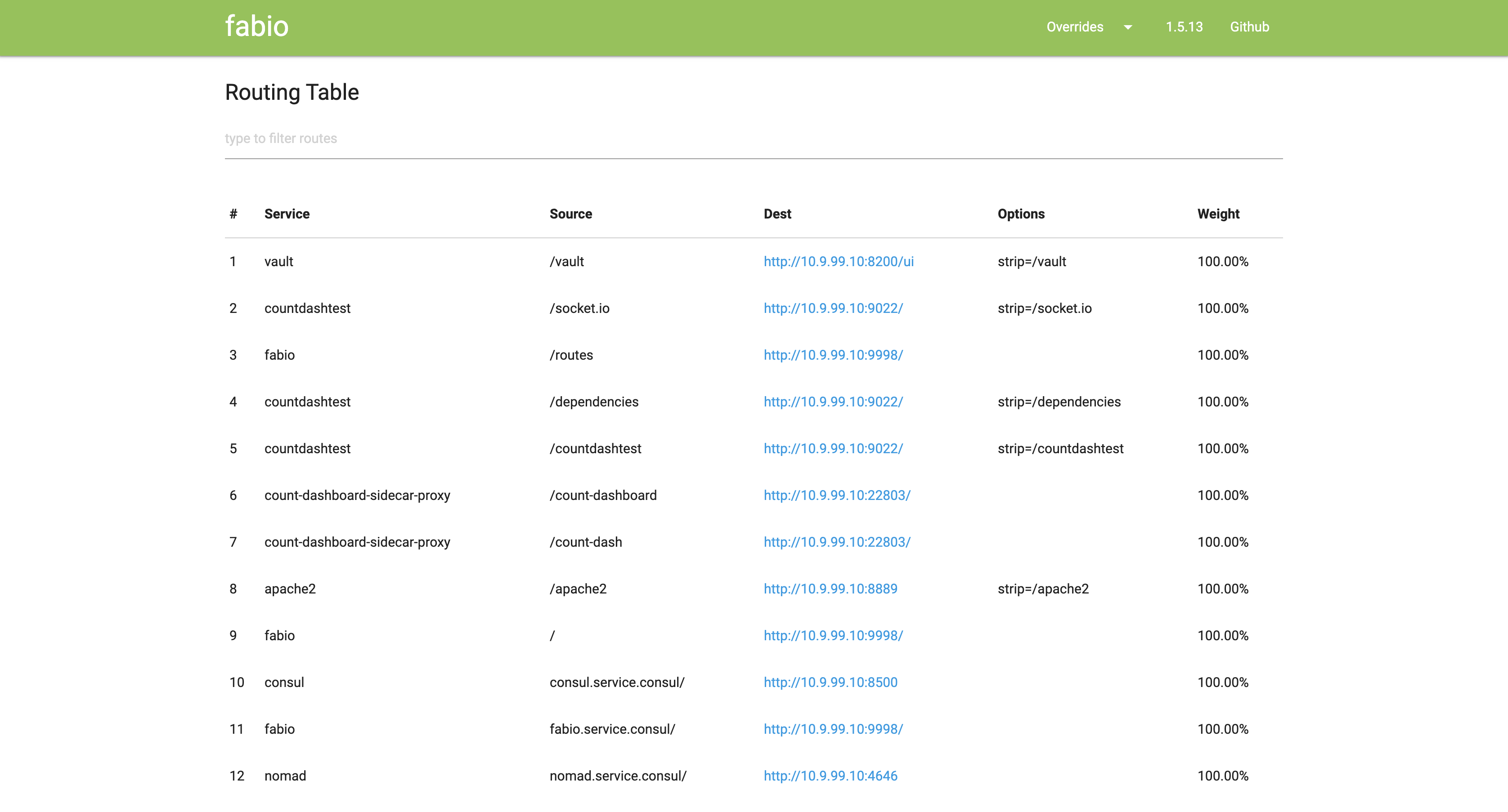
vagrant up --provision-with nomad
Fabio runs as a Nomad job, see hashicorp/nomad/jobs/fabio.nomad
Some routes are added via Consul, see hashicorp/consul.sh
Consul is a service networking solution to connect and secure services across any runtime platform and public or private cloud
To use Consul as a DNS resolver from your laptop, you can create the following file
/etc/resolver/consul
nameserver 10.9.99.10
port 8600
Now names such as nomad.service.consul and fabio.service.consul will work
vagrant up --provision-with consul
Bringing machine 'user.local.dev' up with 'virtualbox' provider...
==> user.local.dev: Checking if box 'ubuntu/xenial64' version '20190918.0.0' is up to date...
==> user.local.dev: [vagrant-hostsupdater] Checking for host entries
==> user.local.dev: [vagrant-hostsupdater] found entry for: 10.9.99.10 user.local.dev
==> user.local.dev: [vagrant-hostsupdater] found entry for: 10.9.99.10 user.local.dev
==> user.local.dev: Running provisioner: consul (shell)...
user.local.dev: Running: /var/folders/7j/gsrjvmds05n53ddg28krf4_80001p9/T/vagrant-shell20200110-35654-11zwf6z.sh
user.local.dev: Reading package lists...
user.local.dev: Building dependency tree...
user.local.dev: Reading state information...
user.local.dev: unzip is already the newest version (6.0-20ubuntu1).
user.local.dev: curl is already the newest version (7.47.0-1ubuntu2.14).
user.local.dev: jq is already the newest version (1.5+dfsg-1ubuntu0.1).
user.local.dev: 0 upgraded, 0 newly installed, 0 to remove and 4 not upgraded.
user.local.dev: primary_datacenter = "dc1"
user.local.dev: client_addr = "10.9.99.10 127.0.0.1 ::1"
user.local.dev: bind_addr = "0.0.0.0"
user.local.dev: data_dir = "/var/lib/consul"
user.local.dev: datacenter = "dc1"
user.local.dev: disable_host_node_id = true
user.local.dev: disable_update_check = true
user.local.dev: leave_on_terminate = true
user.local.dev: log_level = "INFO"
user.local.dev: ports = {
user.local.dev: grpc = 8502
user.local.dev: dns = 8600
user.local.dev: https = -1
user.local.dev: }
user.local.dev: protocol = 3
user.local.dev: raft_protocol = 3
user.local.dev: recursors = [
user.local.dev: "8.8.8.8",
user.local.dev: "8.8.4.4",
user.local.dev: ]
user.local.dev: server_name = "consul.service.consul"
user.local.dev: ui = true
user.local.dev: ++++ Consul already installed at /usr/local/bin/consul
user.local.dev: ++++ Consul v1.6.2
user.local.dev: Protocol 2 spoken by default, understands 2 to 3 (agent will automatically use protocol >2 when speaking to compatible agents)
user.local.dev: ==> Starting Consul agent...
user.local.dev: Version: 'v1.6.2'
user.local.dev: Node ID: '3e943a0a-d73e-5797-cb3e-f3dc2e6df832'
user.local.dev: Node name: 'user'
user.local.dev: Datacenter: 'dc1' (Segment: '<all>')
user.local.dev: Server: true (Bootstrap: false)
user.local.dev: Client Addr: [0.0.0.0] (HTTP: 8500, HTTPS: -1, gRPC: 8502, DNS: 8600)
user.local.dev: Cluster Addr: 10.9.99.10 (LAN: 8301, WAN: 8302)
user.local.dev: Encrypt: Gossip: false, TLS-Outgoing: false, TLS-Incoming: false, Auto-Encrypt-TLS: false
user.local.dev:
user.local.dev: ==> Log data will now stream in as it occurs:
user.local.dev:
user.local.dev: 2020/01/10 04:13:07 [INFO] raft: Initial configuration (index=1): [{Suffrage:Voter ID:3e943a0a-d73e-5797-cb3e-f3dc2e6df832 Address:10.9.99.10:8300}]
user.local.dev: 2020/01/10 04:13:07 [INFO] serf: EventMemberJoin: user.dc1 10.9.99.10
user.local.dev: 2020/01/10 04:13:07 [INFO] serf: EventMemberJoin: user 10.9.99.10
user.local.dev: 2020/01/10 04:13:07 [INFO] raft: Node at 10.9.99.10:8300 [Follower] entering Follower state (Leader: "")
user.local.dev: 2020/01/10 04:13:07 [INFO] consul: Handled member-join event for server "user.dc1" in area "wan"
user.local.dev: 2020/01/10 04:13:07 [INFO] consul: Adding LAN server user (Addr: tcp/10.9.99.10:8300) (DC: dc1)
user.local.dev: 2020/01/10 04:13:07 [INFO] agent: Started DNS server 0.0.0.0:8600 (udp)
user.local.dev: 2020/01/10 04:13:07 [INFO] agent: Started DNS server 0.0.0.0:8600 (tcp)
user.local.dev: 2020/01/10 04:13:07 [INFO] agent: Started HTTP server on [::]:8500 (tcp)
user.local.dev: 2020/01/10 04:13:07 [INFO] agent: Started gRPC server on [::]:8502 (tcp)
user.local.dev: 2020/01/10 04:13:07 [INFO] agent: started state syncer
user.local.dev: ==> Consul agent running!
user.local.dev: 2020/01/10 04:13:07 [WARN] raft: Heartbeat timeout from "" reached, starting election
user.local.dev: 2020/01/10 04:13:07 [INFO] raft: Node at 10.9.99.10:8300 [Candidate] entering Candidate state in term 2
user.local.dev: 2020/01/10 04:13:07 [INFO] raft: Election won. Tally: 1
user.local.dev: 2020/01/10 04:13:07 [INFO] raft: Node at 10.9.99.10:8300 [Leader] entering Leader state
user.local.dev: 2020/01/10 04:13:07 [INFO] consul: cluster leadership acquired
user.local.dev: 2020/01/10 04:13:07 [INFO] consul: New leader elected: user
user.local.dev: 2020/01/10 04:13:07 [INFO] connect: initialized primary datacenter CA with provider "consul"
user.local.dev: 2020/01/10 04:13:07 [INFO] consul: member 'user' joined, marking health alive
user.local.dev: 2020/01/10 04:13:07 [INFO] agent: Synced service "_nomad-server-4rgldggulg5f54ypvl4pfyqeijtqd3u4"
user.local.dev: /tmp/vagrant-shell: line 4: 19556 Terminated sh -c 'sudo tail -f /var/log/consul.log | { sed "/agent: Synced/ q" && kill $$ ;}'
user.local.dev: Node Address Status Type Build Protocol DC Segment
user.local.dev: user 10.9.99.10:8301 alive server 1.6.2 3 dc1 <all>
user.local.dev: agent:
user.local.dev: check_monitors = 0
user.local.dev: check_ttls = 1
user.local.dev: checks = 11
user.local.dev: services = 11
user.local.dev: build:
user.local.dev: prerelease =
user.local.dev: revision = 1200f25e
user.local.dev: version = 1.6.2
user.local.dev: consul:
user.local.dev: acl = disabled
user.local.dev: bootstrap = false
user.local.dev: known_datacenters = 1
user.local.dev: leader = true
user.local.dev: leader_addr = 10.9.99.10:8300
user.local.dev: server = true
user.local.dev: raft:
user.local.dev: applied_index = 24
user.local.dev: commit_index = 24
user.local.dev: fsm_pending = 0
user.local.dev: last_contact = 0
user.local.dev: last_log_index = 24
user.local.dev: last_log_term = 2
user.local.dev: last_snapshot_index = 0
user.local.dev: last_snapshot_term = 0
user.local.dev: latest_configuration = [{Suffrage:Voter ID:3e943a0a-d73e-5797-cb3e-f3dc2e6df832 Address:10.9.99.10:8300}]
user.local.dev: latest_configuration_index = 1
user.local.dev: num_peers = 0
user.local.dev: protocol_version = 3
user.local.dev: protocol_version_max = 3
user.local.dev: protocol_version_min = 0
user.local.dev: snapshot_version_max = 1
user.local.dev: snapshot_version_min = 0
user.local.dev: state = Leader
user.local.dev: term = 2
user.local.dev: runtime:
user.local.dev: arch = amd64
user.local.dev: cpu_count = 2
user.local.dev: goroutines = 115
user.local.dev:
user.local.dev: max_procs = 2
user.local.dev: os = linux
user.local.dev: version = go1.12.13
user.local.dev: serf_lan:
user.local.dev: coordinate_resets = 0
user.local.dev: encrypted = false
user.local.dev: event_queue = 1
user.local.dev: event_time = 2
user.local.dev: failed = 0
user.local.dev: health_score = 0
user.local.dev: intent_queue = 0
user.local.dev: left = 0
user.local.dev: member_time = 1
user.local.dev: members = 1
user.local.dev: query_queue = 0
user.local.dev: query_time = 1
user.local.dev: serf_wan:
user.local.dev: coordinate_resets = 0
user.local.dev: encrypted = false
user.local.dev: event_queue = 0
user.local.dev: event_time = 1
user.local.dev: failed = 0
user.local.dev: health_score = 0
user.local.dev: intent_queue = 0
user.local.dev: left = 0
user.local.dev: member_time = 1
user.local.dev: members = 1
user.local.dev: query_queue = 0
user.local.dev: query_time = 1
user.local.dev: ++++ Adding Consul KV data for Fabio Load Balancer Routes
user.local.dev: Success! Data written to: fabio/config/vault
user.local.dev: Success! Data written to: fabio/config/nomad
user.local.dev: Success! Data written to: fabio/config/consul
user.local.dev: ++++ Consul http:https://localhost:8500
https://docs.hashicorp.com/sentinel/ https://github.com/hashicorp/tfe-policies-example https://docs.hashicorp.com/sentinel/language/
Sentinel is a language and framework for policy built to be embedded in existing software to enable fine-grained, logic-based policy decisions. A policy describes under what circumstances certain behaviors are allowed. Sentinel is an enterprise-only feature of HashiCorp Consul, Nomad, Terraform, and Vault.
vagrant up --provision-with sentinel
Bringing machine 'user.local.dev' up with 'virtualbox' provider...
==> user.local.dev: Checking if box 'ubuntu/bionic64' version '20191218.0.0' is up to date...
==> user.local.dev: [vagrant-hostsupdater] Checking for host entries
==> user.local.dev: [vagrant-hostsupdater] found entry for: 10.9.99.10 user.local.dev
==> user.local.dev: Running provisioner: sentinel (shell)...
user.local.dev: Running: /var/folders/7j/gsrjvmds05n53ddg28krf4_80001p9/T/vagrant-shell20200310-40084-1bbypjm.sh
user.local.dev: Reading package lists...
user.local.dev: Building dependency tree...
user.local.dev:
user.local.dev: Reading state information...
user.local.dev: unzip is already the newest version (6.0-21ubuntu1).
user.local.dev: jq is already the newest version (1.5+dfsg-2).
user.local.dev: curl is already the newest version (7.58.0-2ubuntu3.8).
user.local.dev: 0 upgraded, 0 newly installed, 0 to remove and 6 not upgraded.
user.local.dev: ++++ Sentinel Simulator v0.9.2 already installed at /usr/local/bin/sentinel
user.local.dev: hour = 4
user.local.dev: main = rule { hour >= 0 and hour < 12 }
user.local.dev: ++++ cat /tmp/policy.sentinel
user.local.dev: hour = 4
user.local.dev: main = rule { hour >= 0 and hour < 12 }
user.local.dev: ++++ sentinel apply /tmp/policy.sentinel
user.local.dev: Pass
user.local.dev: ++++ Let's test some more advanced Sentinel Policies
user.local.dev: ++++ https://github.com/hashicorp/tfe-policies-example
user.local.dev: ++++ https://docs.hashicorp.com/sentinel/language/
user.local.dev: ++++ sentinel test aws-block-allow-all-cidr.sentinel
user.local.dev: PASS - aws-block-allow-all-cidr.sentinel
user.local.dev: PASS - test/aws-block-allow-all-cidr/empty.json
user.local.dev: PASS - test/aws-block-allow-all-cidr/fail.json
user.local.dev: PASS - test/aws-block-allow-all-cidr/pass.json
user.local.dev: ERROR - test/aws-block-allow-all-cidr/plan.json
user.local.dev:
user.local.dev: ++++ sentinel apply -config ./test/aws-block-allow-all-cidr/pass.json aws-block-allow-all-cidr.sentinel
user.local.dev: Pass
user.local.dev: ++++ sentinel apply -config ./test/aws-block-allow-all-cidr/fail.json aws-block-allow-all-cidr.sentinel
user.local.dev: Fail
user.local.dev:
user.local.dev: Execution trace. The information below will show the values of all
user.local.dev: the rules evaluated and their intermediate boolean expressions. Note that
user.local.dev: some boolean expressions may be missing if short-circuit logic was taken.
user.local.dev: FALSE - aws-block-allow-all-cidr.sentinel:69:1 - Rule "main"
user.local.dev: TRUE - aws-block-allow-all-cidr.sentinel:70:2 - ingress_cidr_blocks
user.local.dev: TRUE - aws-block-allow-all-cidr.sentinel:50:2 - all get_resources("aws_security_group") as sg {
user.local.dev: all sg.applied.ingress as ingress {
user.local.dev: all disallowed_cidr_blocks as block {
user.local.dev: ingress.cidr_blocks not contains block
user.local.dev: }
user.local.dev: }
user.local.dev: }
user.local.dev: FALSE - aws-block-allow-all-cidr.sentinel:71:2 - egress_cidr_blocks
user.local.dev: FALSE - aws-block-allow-all-cidr.sentinel:60:2 - all get_resources("aws_security_group") as sg {
user.local.dev: all sg.applied.egress as egress {
user.local.dev: all disallowed_cidr_blocks as block {
user.local.dev: egress.cidr_blocks not contains block
user.local.dev: }
user.local.dev: }
user.local.dev: }
user.local.dev:
user.local.dev: FALSE - aws-block-allow-all-cidr.sentinel:59:1 - Rule "egress_cidr_blocks"
user.local.dev:
user.local.dev: TRUE - aws-block-allow-all-cidr.sentinel:49:1 - Rule "ingress_cidr_blocks"
user.local.dev:
user.local.dev: ++++ sentinel test aws-alb-redirect.sentinel
user.local.dev: PASS - aws-alb-redirect.sentinel
user.local.dev: PASS - test/aws-alb-redirect/empty.json
user.local.dev: PASS - test/aws-alb-redirect/fail.json
user.local.dev: PASS - test/aws-alb-redirect/pass.json
user.local.dev: ERROR - test/aws-alb-redirect/plan.json
user.local.dev:
user.local.dev: ++++ sentinel apply -config ./test/aws-alb-redirect/fail.json aws-alb-redirect.sentinel
user.local.dev: Fail
user.local.dev:
user.local.dev: Execution trace. The information below will show the values of all
user.local.dev: the rules evaluated and their intermediate boolean expressions. Note that
user.local.dev: some boolean expressions may be missing if short-circuit logic was taken.
user.local.dev: FALSE - aws-alb-redirect.sentinel:69:1 - Rule "main"
user.local.dev: FALSE - aws-alb-redirect.sentinel:70:2 - default_action
user.local.dev: FALSE - aws-alb-redirect.sentinel:49:2 - all get_resources("aws_lb_listener") as ln {
user.local.dev: all ln.applied.default_action as action {
user.local.dev:
user.local.dev: all action.redirect as rdir {
user.local.dev:
user.local.dev: rdir.status_code == redirect_status_code
user.local.dev: }
user.local.dev: }
user.local.dev: }
user.local.dev:
user.local.dev: FALSE - aws-alb-redirect.sentinel:48:1 - Rule "default_action"
user.local.dev:
user.local.dev: ++++ sentinel apply -config ./test/aws-alb-redirect/pass.json aws-alb-redirect.sentinel
user.local.dev: Pass
https://www.terraform.io/docs/enterprise/index.html
Terraform Enterprise is our self-hosted distribution of Terraform Cloud. It offers enterprises a private instance of the Terraform Cloud application, with no resource limits and with additional enterprise-grade architectural features like audit logging and SAML single sign-on.
Terraform Cloud is an application that helps teams use Terraform together. It manages Terraform runs in a consistent and reliable environment, and includes easy access to shared state and secret data, access controls for approving changes to infrastructure, a private registry for sharing Terraform modules, detailed policy controls for governing the contents of Terraform configurations, and more.
For independent teams and small to medium-sized businesses, Terraform Cloud is also available as a hosted service at https://app.terraform.io.
Make sure you get a Terraform Licence file and place it in hashicorp directory e.g hashicorp/ptfe-license.rli
When you run vagrant up --provision-with terraform-enterprise system logs and docker logs will be followed, the output will be in read, don't worry. This is for status output, the installation takes a while. The output will end when Terraform Enterprise is ready.
Once done, you will see ++++ To finish the installation go to http:https://10.9.99.10:8800
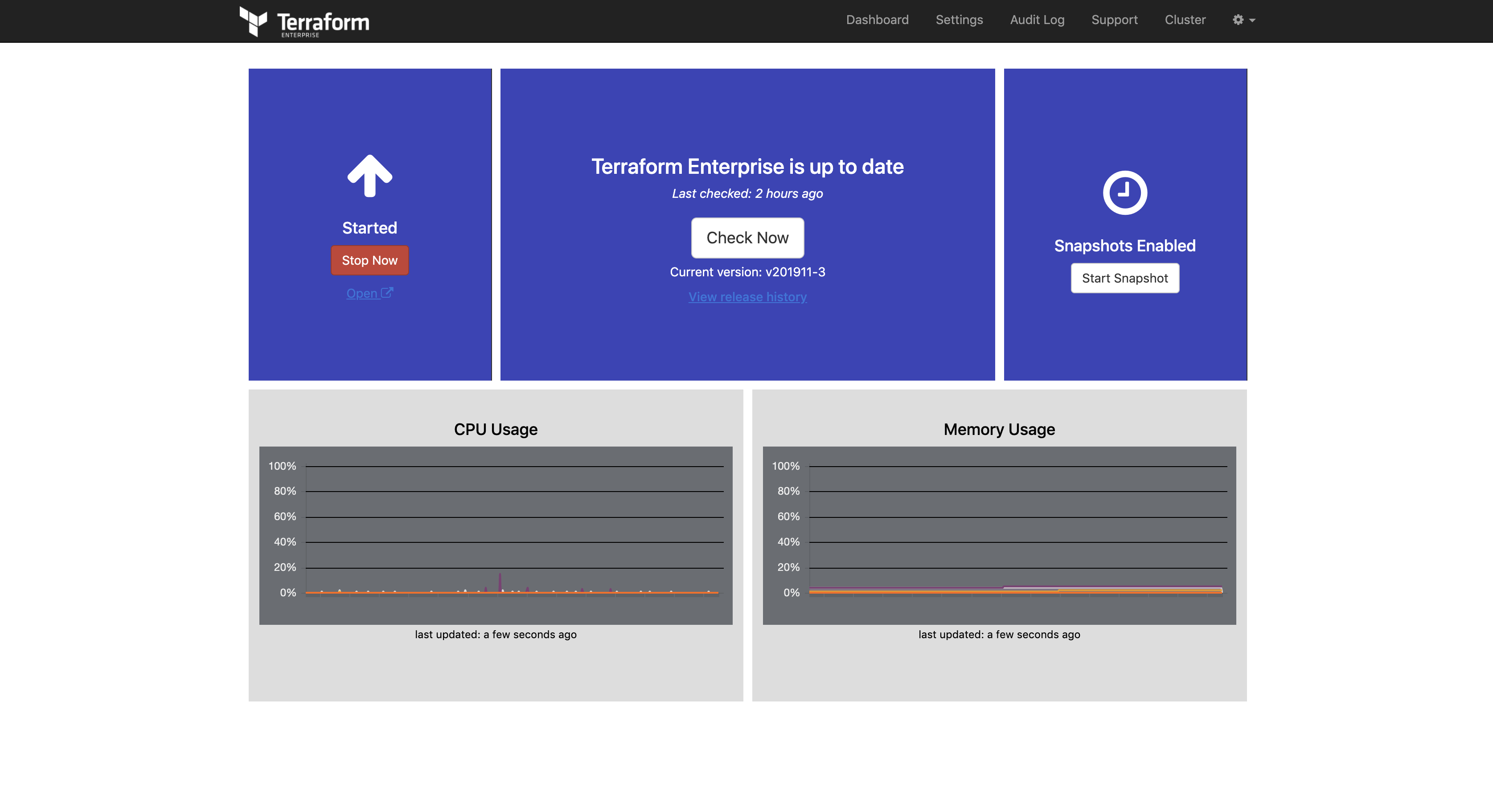
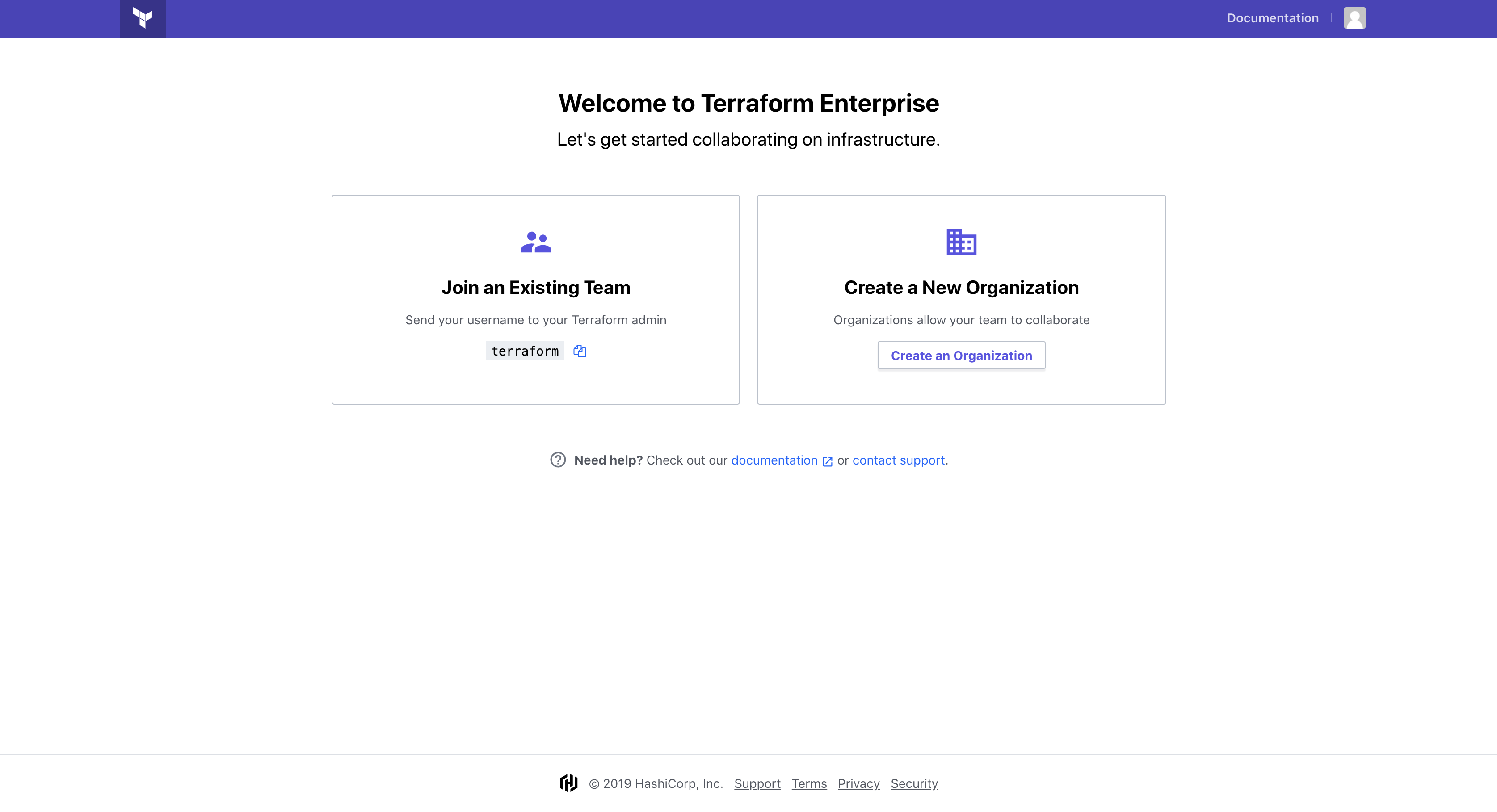
vagrant up --provision-with terraform-enterprise
Bringing machine 'user.local.dev' up with 'virtualbox' provider...
==> user.local.dev: Checking if box 'ubuntu/xenial64' version '20190918.0.0' is up to date...
==> user.local.dev: [vagrant-hostsupdater] Checking for host entries
==> user.local.dev: [vagrant-hostsupdater] found entry for: 10.9.99.10 user.local.dev
==> user.local.dev: [vagrant-hostsupdater] found entry for: 10.9.99.10 user.local.dev
==> user.local.dev: [vagrant-hostsupdater] found entry for: 10.9.99.10 consul-user.local.dev
==> user.local.dev: [vagrant-hostsupdater] found entry for: 10.9.99.10 vault-user.local.dev
==> user.local.dev: [vagrant-hostsupdater] found entry for: 10.9.99.10 nomad-user.local.dev
==> user.local.dev: Running provisioner: terraform-enterprise (shell)...
user.local.dev: Running: /var/folders/7j/gsrjvmds05n53ddg28krf4_80001p9/T/vagrant-shell20191118-33309-16vz6hz.sh
...
user.local.dev: Installing replicated-operator service
user.local.dev: Starting replicated-operator service
user.local.dev:
user.local.dev: Operator installation successful
user.local.dev: To continue the installation, visit the following URL in your browser:
user.local.dev:
user.local.dev: http:https://10.9.99.10:8800
A consistent developer workflow to build, deploy, and release applications across any platform.
Waypoint supports
- aws-ec2
- aws-ecs
- azure-container-instance
- docker
- exec
- google-cloud-run
- kubernetes
- netlify
- nomad
- pack
https://www.hashicorp.com/blog/announcing-waypoint https://www.waypointproject.io/
Waypoint is a wonderful project and it's a firstclass citizen of Hashicorp and runs flawlessly on Nomad. To run Waypoint on Nomad do:
vagrant up --provision-with basetools --provider docker
vagrant up --provision-with docker --provider docker
vagrant up --provision-with consul --provider docker
vagrant up --provision-with nomad --provider docker
vagrant up --provision-with waypoint-nomad --provider docker
Waypoint cab also run on Kubernetes and we can test Waypoint using Minikube To run Waypoint on Kubernetes (Minikube) do:
vagrant up --provision-with basetools --provider docker
vagrant up --provision-with docker --provider docker
vagrant up --provision-with minikube --provider docker
vagrant up --provision-with waypoint-kubernetes-minikube --provider docker
To access the documentation site you can run:
vagrant up --provision-with docsify --provider docker
vagrant up --provision-with waypoint
Bringing machine 'hashiqube0.service.consul' up with 'virtualbox' provider...
==> hashiqube0.service.consul: Checking if box 'ubuntu/bionic64' version '20200429.0.0' is up to date...
==> hashiqube0.service.consul: A newer version of the box 'ubuntu/bionic64' for provider 'virtualbox' is
==> hashiqube0.service.consul: available! You currently have version '20200429.0.0'. The latest is version
==> hashiqube0.service.consul: '20201016.0.0'. Run `vagrant box update` to update.
==> hashiqube0.service.consul: [vagrant-hostsupdater] Checking for host entries
==> hashiqube0.service.consul: [vagrant-hostsupdater] found entry for: 10.9.99.10 hashiqube0.service.consul
==> hashiqube0.service.consul: [vagrant-hostsupdater] found entry for: 10.9.99.10 hashiqube0.service.consul
==> hashiqube0.service.consul: Running provisioner: waypoint (shell)...
hashiqube0.service.consul: Running: /var/folders/7j/gsrjvmds05n53ddg28krf4_80001p9/T/vagrant-shell20201019-11073-1uuxwal.sh
hashiqube0.service.consul: Reading package lists...
hashiqube0.service.consul: Building dependency tree...
hashiqube0.service.consul: Reading state information...
hashiqube0.service.consul: unzip is already the newest version (6.0-21ubuntu1).
hashiqube0.service.consul: jq is already the newest version (1.5+dfsg-2).
hashiqube0.service.consul: curl is already the newest version (7.58.0-2ubuntu3.10).
hashiqube0.service.consul: The following packages were automatically installed and are no longer required:
hashiqube0.service.consul: linux-image-4.15.0-99-generic linux-modules-4.15.0-99-generic
hashiqube0.service.consul: Use 'sudo apt autoremove' to remove them.
hashiqube0.service.consul: 0 upgraded, 0 newly installed, 0 to remove and 30 not upgraded.
hashiqube0.service.consul: WARNING! This will remove:
hashiqube0.service.consul: - all stopped containers
hashiqube0.service.consul: - all networks not used by at least one container
hashiqube0.service.consul: - all images without at least one container associated to them
hashiqube0.service.consul: - all build cache
hashiqube0.service.consul:
hashiqube0.service.consul: Are you sure you want to continue? [y/N]
hashiqube0.service.consul: Deleted Images:
hashiqube0.service.consul: deleted: sha256:6a104eb535fb892b25989f966e8775a4adf9b30590862c60745ab78aad58426e
...
hashiqube0.service.consul: untagged: heroku/pack:18
hashiqube0.service.consul: untagged: heroku/pack@sha256:52f6bc7a03ccf8680948527e51d4b089a178596d8835d8c884934e45272c2474
hashiqube0.service.consul: deleted: sha256:b7b0e91d132e0874539ea0efa0eb4309a12e322b9ef64852ec05c13219ee2c36
hashiqube0.service.consul: Total reclaimed space: 977.6MB
hashiqube0.service.consul: WARNING! This will remove:
hashiqube0.service.consul: - all stopped containers
hashiqube0.service.consul: - all networks not used by at least one container
hashiqube0.service.consul: - all volumes not used by at least one container
hashiqube0.service.consul: - all dangling images
hashiqube0.service.consul: - all dangling build cache
hashiqube0.service.consul:
hashiqube0.service.consul: Are you sure you want to continue? [y/N]
hashiqube0.service.consul: Deleted Volumes:
hashiqube0.service.consul: pack-cache-e74b422cf62f.build
hashiqube0.service.consul: pack-cache-e74b422cf62f.launch
hashiqube0.service.consul: Total reclaimed space: 179.4MB
hashiqube0.service.consul: ++++ Waypoint already installed at /usr/local/bin/waypoint
hashiqube0.service.consul: ++++ Waypoint v0.1.2 (edf37a09)
hashiqube0.service.consul: ++++ Docker pull Waypoint Server container
hashiqube0.service.consul: latest:
hashiqube0.service.consul: Pulling from hashicorp/waypoint
hashiqube0.service.consul: Digest: sha256:689cae07ac8836ceba1f49c0c36ef57b27ebf61d36009bc309d2198e7825beb9
hashiqube0.service.consul: Status: Image is up to date for hashicorp/waypoint:latest
hashiqube0.service.consul: docker.io/hashicorp/waypoint:latest
hashiqube0.service.consul: waypoint-server
hashiqube0.service.consul: waypoint-server
hashiqube0.service.consul: ++++ Waypoint Server starting
hashiqube0.service.consul: Creating waypoint network...
hashiqube0.service.consul: Installing waypoint server to docker
hashiqube0.service.consul: +: Server container started
hashiqube0.service.consul: Service ready. Connecting to: localhost:9701
hashiqube0.service.consul: Retrieving initial auth token...
hashiqube0.service.consul: ! Error getting the initial token: server is already bootstrapped
hashiqube0.service.consul:
hashiqube0.service.consul: The Waypoint server has been deployed, but due to this error we were
hashiqube0.service.consul: unable to automatically configure the local CLI or the Waypoint server
hashiqube0.service.consul: advertise address. You must do this manually using "waypoint context"
hashiqube0.service.consul: and "waypoint server config-set".
hashiqube0.service.consul: ++++ Git Clone Waypoint examples
hashiqube0.service.consul: Cloning into '/tmp/waypoint-examples'...
hashiqube0.service.consul: -> Validating configuration file...
hashiqube0.service.consul: -> Configuration file appears valid
hashiqube0.service.consul: -> Validating server credentials...
hashiqube0.service.consul: -> Connection to Waypoint server was successful
hashiqube0.service.consul: -> Checking if project "example-nodejs" is registered...
hashiqube0.service.consul: -> Project "example-nodejs" and all apps are registered with the server.
hashiqube0.service.consul: -> Validating required plugins...
hashiqube0.service.consul: -> Plugins loaded and configured successfully
hashiqube0.service.consul: -> Checking auth for the configured components...
hashiqube0.service.consul: -> Checking auth for app: "example-nodejs"
hashiqube0.service.consul: -> Authentication requirements appear satisfied.
hashiqube0.service.consul: Project initialized!
hashiqube0.service.consul: You may now call 'waypoint up' to deploy your project or
hashiqube0.service.consul: commands such as 'waypoint build' to perform steps individually.
hashiqube0.service.consul:
hashiqube0.service.consul: » Building...
hashiqube0.service.consul: Creating new buildpack-based image using builder: heroku/buildpacks:18
hashiqube0.service.consul: -> Creating pack client
hashiqube0.service.consul: -> Building image
hashiqube0.service.consul: 2020/10/19 00:21:34.146368 DEBUG: Pulling image index.docker.io/heroku/buildpacks:18
hashiqube0.service.consul: 18: Pulling from heroku/buildpacks
6deb54562bfb: Downloading 4.615kB/4.615kB
...
6deb54562bfb: Download complete
797d95067ecf: .service.consul:
hashiqube0.service.consul: Downloading 1.616MB/225.9MB
...
4f4fb700ef54: Pull complete l:
hashiqube0.service.consul: Digest: sha256:27253508524ce1d6bbd70276425f6185743079ac7b389559c18e3f5843491272
hashiqube0.service.consul: Status: Downloaded newer image for heroku/buildpacks:18
hashiqube0.service.consul: 2020/10/19 00:22:51.943378 DEBUG: Selected run image heroku/pack:18
hashiqube0.service.consul: 2020/10/19 00:22:56.504815 DEBUG: Pulling image heroku/pack:18
hashiqube0.service.consul: 18: Pulling from heroku/pack
hashiqube0.service.consul:
171857c49d0f: Already exists :
hashiqube0.service.consul:
419640447d26: Already exists :
hashiqube0.service.consul:
61e52f862619: Already exists :
hashiqube0.service.consul:
c97d646ce0ef: Already exists :
hashiqube0.service.consul:
3776f40e285d: Already exists :
hashiqube0.service.consul:
5ca5846f3d21: Pulling fs layer
6b143b2e1683: Pulling fs layer
6b143b2e1683: Downloading 436B/4.537kB
6b143b2e1683: Downloading 4.537kB/4.537kB
6b143b2e1683: Verifying Checksum
hashiqube0.service.consul: Download complete
5ca5846f3d21: Extracting 99B/99BB
5ca5846f3d21: Extracting 99B/99B
5ca5846f3d21: Pull complete l:
6b143b2e1683: Extracting 4.537kB/4.537kB
6b143b2e1683: Extracting 4.537kB/4.537kB
6b143b2e1683: Pull complete l:
hashiqube0.service.consul: Digest: sha256:48e491dd56cc67b120039c958cfddeaf3f8752161efa85756d73c09fde413477
hashiqube0.service.consul: Status: Downloaded newer image for heroku/pack:18
hashiqube0.service.consul: 2020/10/19 00:23:02.430378 DEBUG: Creating builder with the following buildpacks:
hashiqube0.service.consul: 2020/10/19 00:23:02.430417 DEBUG: -> heroku/[email protected]
hashiqube0.service.consul: 2020/10/19 00:23:02.430423 DEBUG: -> heroku/[email protected]
hashiqube0.service.consul: 2020/10/19 00:23:02.430427 DEBUG: -> heroku/[email protected]
hashiqube0.service.consul: 2020/10/19 00:23:02.430432 DEBUG: -> heroku/[email protected]
hashiqube0.service.consul: 2020/10/19 00:23:02.430436 DEBUG: -> heroku/[email protected]
hashiqube0.service.consul: 2020/10/19 00:23:02.430439 DEBUG: -> heroku/[email protected]
hashiqube0.service.consul: 2020/10/19 00:23:02.430442 DEBUG: -> heroku/[email protected]
hashiqube0.service.consul: 2020/10/19 00:23:02.430447 DEBUG: -> heroku/[email protected]
hashiqube0.service.consul: 2020/10/19 00:23:02.430451 DEBUG: -> heroku/[email protected]
hashiqube0.service.consul: 2020/10/19 00:23:02.430455 DEBUG: -> heroku/[email protected]
hashiqube0.service.consul: 2020/10/19 00:23:02.430464 DEBUG: -> heroku/[email protected]
hashiqube0.service.consul: 2020/10/19 00:23:02.430471 DEBUG: -> heroku/[email protected]
hashiqube0.service.consul: 2020/10/19 00:23:02.430475 DEBUG: -> heroku/[email protected]
hashiqube0.service.consul: 2020/10/19 00:23:02.430483 DEBUG: -> heroku/[email protected]
hashiqube0.service.consul: 2020/10/19 00:23:02.430489 DEBUG: -> heroku/[email protected]
hashiqube0.service.consul: 2020/10/19 00:23:02.430495 DEBUG: -> salesforce/[email protected]
hashiqube0.service.consul: 2020/10/19 00:23:02.430505 DEBUG: -> projectriff/[email protected]
hashiqube0.service.consul: 2020/10/19 00:23:02.430528 DEBUG: -> projectriff/[email protected]
hashiqube0.service.consul: 2020/10/19 00:23:02.430534 DEBUG: -> evergreen/[email protected]
hashiqube0.service.consul: 2020/10/19 00:23:06.713138 DEBUG: Pulling image buildpacksio/lifecycle:0.9.1
hashiqube0.service.consul: 0.9.1: Pulling from buildpacksio/lifecycle
hashiqube0.service.consul:
4000adbbc3eb: Pulling fs layer
474f7dcb012d: Pulling fs layer
...
474f7dcb012d: Pull complete l:
hashiqube0.service.consul: Digest: sha256:53bf0e18a734e0c4071aa39b950ed8841f82936e53fb2a0df56c6aa07f9c5023
hashiqube0.service.consul: Status: Downloaded newer image for buildpacksio/lifecycle:0.9.1
hashiqube0.service.consul: 2020/10/19 00:23:14.338504 DEBUG: Using build cache volume pack-cache-e74b422cf62f.build
hashiqube0.service.consul: 2020/10/19 00:23:14.338523 INFO: ===> DETECTING
hashiqube0.service.consul: [detector] ======== Output: heroku/[email protected] ========
hashiqube0.service.consul: [detector] no
hashiqube0.service.consul: [detector] err: heroku/[email protected] (1)
hashiqube0.service.consul: [detector] ======== Output: heroku/[email protected] ========
hashiqube0.service.consul: [detector] Could not find a pom.xml file! Please check that it exists and is committed to Git.
hashiqube0.service.consul: [detector] err: heroku/[email protected] (1)
hashiqube0.service.consul: [detector] err: salesforce/[email protected] (1)
hashiqube0.service.consul: [detector] 3 of 4 buildpacks participating
hashiqube0.service.consul: [detector] heroku/nodejs-engine 0.4.4
hashiqube0.service.consul: [detector] heroku/nodejs-npm 0.2.0
hashiqube0.service.consul: [detector] heroku/procfile 0.5
hashiqube0.service.consul: 2020/10/19 00:23:15.788888 INFO: ===> ANALYZING
hashiqube0.service.consul: [analyzer] Restoring metadata for "heroku/nodejs-engine:nodejs" from app image
hashiqube0.service.consul: 2020/10/19 00:23:16.543000 INFO: ===> RESTORING
hashiqube0.service.consul: [restorer] Removing "heroku/nodejs-engine:nodejs", not in cache
hashiqube0.service.consul: 2020/10/19 00:23:17.220776 INFO: ===> BUILDING
hashiqube0.service.consul: [builder] ---> Node.js Buildpack
hashiqube0.service.consul: [builder] ---> Installing toolbox
hashiqube0.service.consul: [builder] ---> - jq
hashiqube0.service.consul: [builder] ---> - yj
hashiqube0.service.consul: [builder] ---> Getting Node version
hashiqube0.service.consul: [builder] ---> Resolving Node version
hashiqube0.service.consul: [builder] ---> Downloading and extracting Node v12.19.0
hashiqube0.service.consul: [builder] ---> Parsing package.json
hashiqube0.service.consul: [builder] ---> Using npm v6.14.8 from Node
hashiqube0.service.consul: [builder] ---> Installing node modules
hashiqube0.service.consul: [builder]
hashiqube0.service.consul: [builder] > [email protected] postinstall /workspace/node_modules/ejs
hashiqube0.service.consul: [builder] > node ./postinstall.js
hashiqube0.service.consul: [builder]
hashiqube0.service.consul: [builder] Thank you for installing EJS: built with the Jake JavaScript build tool (https://jakejs.com/)
hashiqube0.service.consul: [builder]
hashiqube0.service.consul: [builder] npm WARN [email protected] No repository field.
hashiqube0.service.consul: [builder]
hashiqube0.service.consul: [builder] added 131 packages from 107 contributors and audited 131 packages in 4.554s
hashiqube0.service.consul: [builder]
hashiqube0.service.consul: [builder] 26 packages are looking for funding
hashiqube0.service.consul: [builder] run `npm fund` for details
hashiqube0.service.consul: [builder]
hashiqube0.service.consul: [builder] found 0 vulnerabilities
hashiqube0.service.consul: [builder]
hashiqube0.service.consul: [builder] -----> Discovering process types
hashiqube0.service.consul: [builder] Procfile declares types -> web
hashiqube0.service.consul: 2020/10/19 00:24:22.424730 INFO: ===> EXPORTING
hashiqube0.service.consul: [exporter] Reusing layer 'heroku/nodejs-engine:nodejs'
hashiqube0.service.consul: [exporter] Reusing 1/1 app layer(s)
hashiqube0.service.consul: [exporter] Reusing layer 'launcher'
hashiqube0.service.consul: [exporter] Reusing layer 'config'
hashiqube0.service.consul: [exporter] Adding label 'io.buildpacks.lifecycle.metadata'
hashiqube0.service.consul: [exporter] Adding label 'io.buildpacks.build.metadata'
hashiqube0.service.consul: [exporter] Adding label 'io.buildpacks.project.metadata'
hashiqube0.service.consul: [exporter] *** Images (f58c7abc7584):
hashiqube0.service.consul: [exporter] index.docker.io/library/example-nodejs:latest
hashiqube0.service.consul: [exporter] Adding cache layer 'heroku/nodejs-engine:nodejs'
hashiqube0.service.consul: [exporter] Adding cache layer 'heroku/nodejs-engine:toolbox'
hashiqube0.service.consul: -> Injecting entrypoint binary to image
hashiqube0.service.consul:
hashiqube0.service.consul: » Deploying...
hashiqube0.service.consul: -> Setting up waypoint network
hashiqube0.service.consul: -> Creating new container
hashiqube0.service.consul: -> Starting container
hashiqube0.service.consul: -> App deployed as container: example-nodejs-01EMZ3X20HX35FRA3F28AAFHFA
hashiqube0.service.consul:
hashiqube0.service.consul: » Releasing...
hashiqube0.service.consul:
hashiqube0.service.consul: » Pruning old deployments...
hashiqube0.service.consul: Deployment: 01EMT63W8YBMWM5CGK05XGTC44
hashiqube0.service.consul: Deleting container...
hashiqube0.service.consul:
hashiqube0.service.consul: The deploy was successful! A Waypoint deployment URL is shown below. This
hashiqube0.service.consul: can be used internally to check your deployment and is not meant for external
hashiqube0.service.consul: traffic. You can manage this hostname using "waypoint hostname."
hashiqube0.service.consul:
hashiqube0.service.consul: URL: https://annually-peaceful-terrapin.waypoint.run
hashiqube0.service.consul: Deployment URL: https://annually-peaceful-terrapin--v4.waypoint.run
hashiqube0.service.consul: ++++ Waypoint Server https://localhost:9702 and enter the following Token displayed below
hashiqube0.service.consul: bM152PWkXxfoy4vA51JFhR7LmV9FA9RLbSpHoKrysFnwnRCAGzV2RExsyAmBrHu784d1WZRW6Cx4MkhvWzkDHvEn49c4wkSZYScfJ
Boundary is designed to grant access to critical systems using the principle of least privilege, solving challenges organizations encounter when users need to securely access applications and machines. Traditional products that grant access to systems are cumbersome, painful to maintain, or are black boxes lacking extensible APIs. Boundary allows authenticated and authorized users to access secure systems in private networks without granting access to the larger network where those systems reside.
vagrant up --provision-with boundary
Bringing machine 'hashiqube0.service.consul' up with 'virtualbox' provider...
==> hashiqube0.service.consul: Checking if box 'ubuntu/bionic64' version '20200429.0.0' is up to date...
==> hashiqube0.service.consul: [vagrant-hostsupdater] Checking for host entries
==> hashiqube0.service.consul: [vagrant-hostsupdater] found entry for: 10.9.99.10 hashiqube0.service.consul
==> hashiqube0.service.consul: [vagrant-hostsupdater] found entry for: 10.9.99.10 hashiqube0.service.consul
==> hashiqube0.service.consul: Running provisioner: boundary (shell)...
hashiqube0.service.consul: Running: /var/folders/7j/gsrjvmds05n53ddg28krf4_80001p9/T/vagrant-shell20201103-74542-1kv32gp.sh
hashiqube0.service.consul: Reading package lists...
hashiqube0.service.consul: Building dependency tree...
hashiqube0.service.consul:
hashiqube0.service.consul: Reading state information...
hashiqube0.service.consul: unzip is already the newest version (6.0-21ubuntu1).
hashiqube0.service.consul: jq is already the newest version (1.5+dfsg-2).
hashiqube0.service.consul: curl is already the newest version (7.58.0-2ubuntu3.10).
hashiqube0.service.consul: 0 upgraded, 0 newly installed, 0 to remove and 64 not upgraded.
hashiqube0.service.consul: ++++ Bundary already installed at /usr/local/bin/boundary
hashiqube0.service.consul: ++++
hashiqube0.service.consul: Version information:
hashiqube0.service.consul: Git Revision: eccd68d73c3edf14863ecfd31f9023063b809d5a
hashiqube0.service.consul: Version Number: 0.1.1
hashiqube0.service.consul: listener "tcp" {
hashiqube0.service.consul: purpose = "api"
hashiqube0.service.consul: address = "0.0.0.0:19200"
hashiqube0.service.consul: }
hashiqube0.service.consul: ++++ Starting Boundary in dev mode
hashiqube0.service.consul: ==> Boundary server configuration:
hashiqube0.service.consul:
hashiqube0.service.consul: [Controller] AEAD Key Bytes: F8Rr2klI5yUffkNBt0y9LgUDLMLkEQ583A3S1Ab315s=
hashiqube0.service.consul: [Recovery] AEAD Key Bytes: HVC+7Zs4CZlfCV204HG/VL1uYlqKrNkHizdwGflESTw=
hashiqube0.service.consul: [Worker-Auth] AEAD Key Bytes: T3Warqpc25zIpeNebp/+442OoQjejdGxEdykw6tzanA=
hashiqube0.service.consul: [Recovery] AEAD Type: aes-gcm
hashiqube0.service.consul: [Root] AEAD Type: aes-gcm
hashiqube0.service.consul: [Worker-Auth] AEAD Type: aes-gcm
hashiqube0.service.consul: Cgo: disabled
hashiqube0.service.consul: Dev Database Container: relaxed_hermann
hashiqube0.service.consul: Dev Database Url: postgres:https://postgres:password@localhost:32773?sslmode=disable
hashiqube0.service.consul: Generated Auth Method Id: ampw_1234567890
hashiqube0.service.consul: Generated Auth Method Login Name: admin
hashiqube0.service.consul: Generated Auth Method Password: password
hashiqube0.service.consul: Generated Host Catalog Id: hcst_1234567890
hashiqube0.service.consul: Generated Host Id: hst_1234567890
hashiqube0.service.consul: Generated Host Set Id: hsst_1234567890
hashiqube0.service.consul: Generated Org Scope Id: o_1234567890
hashiqube0.service.consul: Generated Project Scope Id: p_1234567890
hashiqube0.service.consul: Generated Target Id: ttcp_1234567890
hashiqube0.service.consul: Listener 1: tcp (addr: "0.0.0.0:19200", max_request_duration: "1m30s", purpose: "api")
hashiqube0.service.consul: Listener 2: tcp (addr: "127.0.0.1:9201", max_request_duration: "1m30s", purpose: "cluster")
hashiqube0.service.consul: Listener 3: tcp (addr: "127.0.0.1:9202", max_request_duration: "1m30s", purpose: "proxy")
hashiqube0.service.consul: Log Level: info
hashiqube0.service.consul: Mlock: supported: true, enabled: false
hashiqube0.service.consul: Version: Boundary v0.1.1
hashiqube0.service.consul: Version Sha: eccd68d73c3edf14863ecfd31f9023063b809d5a
hashiqube0.service.consul: Worker Public Addr: 127.0.0.1:9202
hashiqube0.service.consul:
hashiqube0.service.consul: ==> Boundary server started! Log data will stream in below:
hashiqube0.service.consul:
hashiqube0.service.consul: 2020-11-03T00:02:59.775Z [INFO] controller: cluster address: addr=127.0.0.1:9201
hashiqube0.service.consul: 2020-11-03T00:02:59.775Z [INFO] worker: connected to controller: address=127.0.0.1:9201
hashiqube0.service.consul: 2020-11-03T00:02:59.778Z [INFO] controller: worker successfully authed: name=dev-worker
hashiqube0.service.consul: ++++ Boundary Server started at http:https://localhost:19200
hashiqube0.service.consul: ++++ Login with admin:password
hashiqube0.service.consul: /tmp/vagrant-shell: line 5: 5093 Terminated sh -c 'sudo tail -f /var/log/boundary.log | { sed "/worker successfully authed/ q" && kill $$ ;}'




